- Akhil dislikes red cakes.
- Akhil dislikes fruit cakes.
- He prefers non-chocolatey cakes.
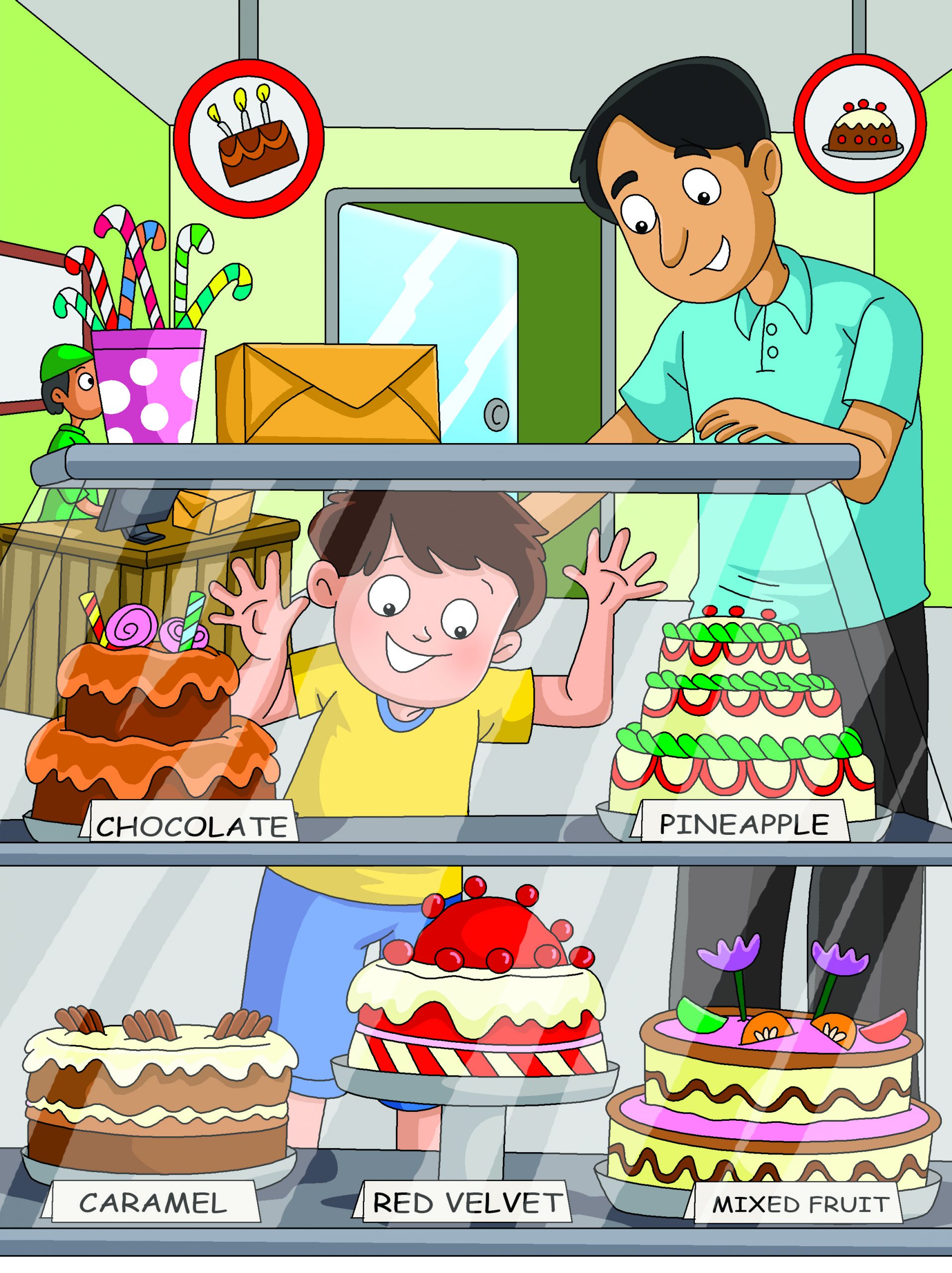


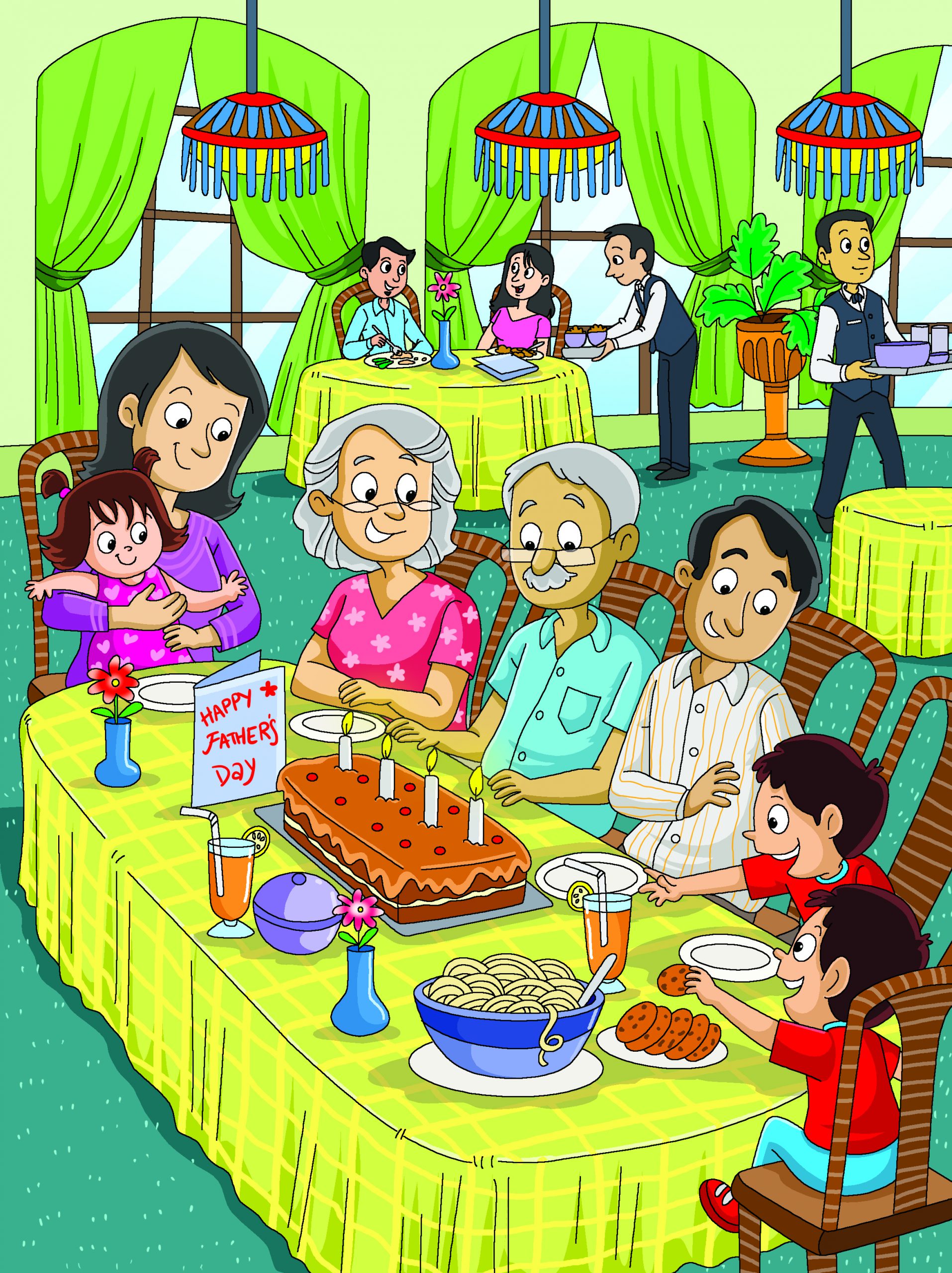
Q1. What is written on the greeting card placed beside the cake?
Q2. How many candles are placed on the cake?
Q3. How many waiters are serving food to the couple?
Q4. What is the boy holding in his hand?
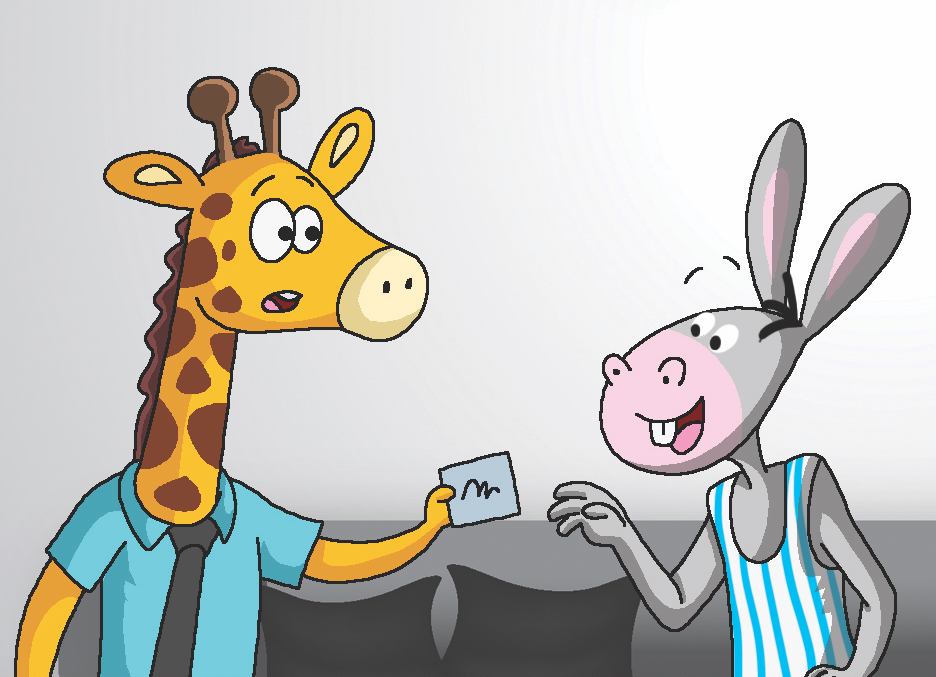
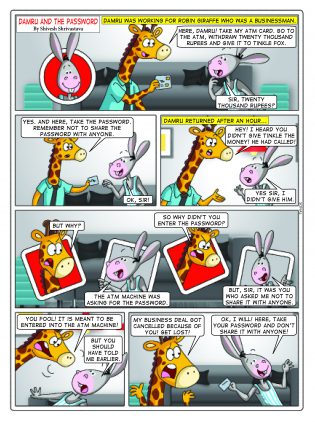
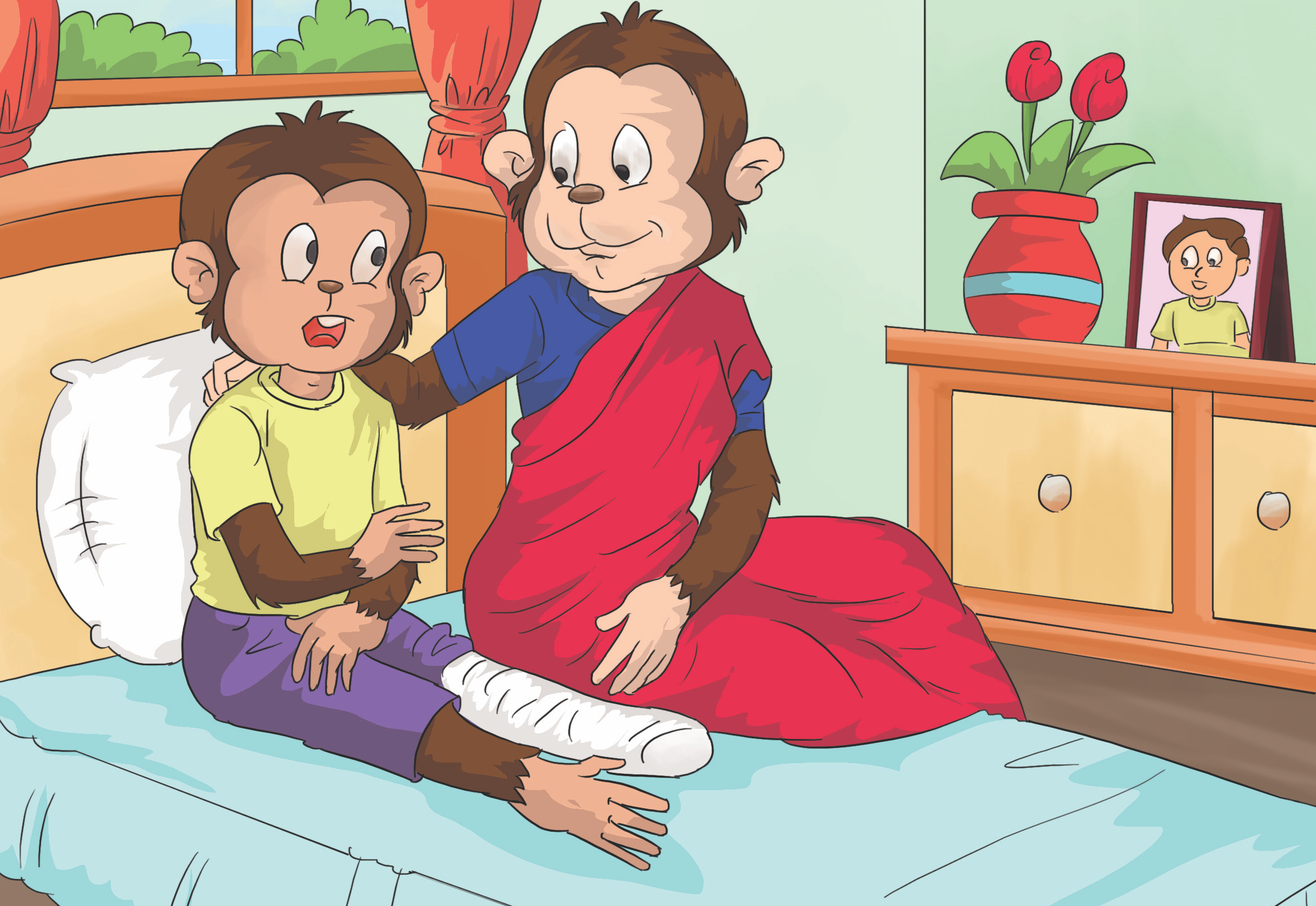
One day Monu monkey found a mobile phone in the forest. Monu was excited to find the phone and jumped across to give the news to his friends. But first, he thought of taking a selfie or his own picture with his new mobile.
He switched on the camera, scrunched up his nose and face and took a selfie. He then showed the selfie to his friends and offered to take a selfie with them too.
All his friends praised his picture. Monu was filled with joy to hear this. He thought that he had found a priceless gift. Now, all his friends would do his work, as he would offer to take their pictures.
Now, Monu did dangerous things like walking on one hand and swinging from a tree while taking selfies. The more his friends praised his pictures, the more Monu wandered around the forest to find new spots to take selfies. He had become addicted to his friends praising him and his pictures.
But Monu’s mother knew that Monu was wasting a lot of his time in taking pictures and was not finishing his studies or helping her with housework.
One day when Monu returned from the forest, mother said, “Monu, you’re just busy going to dangerous places in the forest to take selfies. I am really worried about this. You need to pay attention to your studies. If something untoward takes place, what will happen? You need to think about what you’re doing.”
“Ma, you worry unnecessarily. I am not a kid anymore. I can easily differentiate between right and wrong. You be assured, I can take care of myself,” replied Monu and turned a deaf ear to what ma had said.
Monu became crazy for taking selfies in dangerous places and the praises his friends showered on him, added fuel to this fire.
He had become so bold that he would not think twice to take a selfie near a lion, even. It was common for him to climb on the backs of elephants or giraffes and take selfies.
He was so addicted to taking selfies that he thought himself to be the selfie professional of the whole forest.
Not only did he take selfies better than any other animal, he demanded appreciation from friends all the time. Most of his friends were now fed up with his habit.
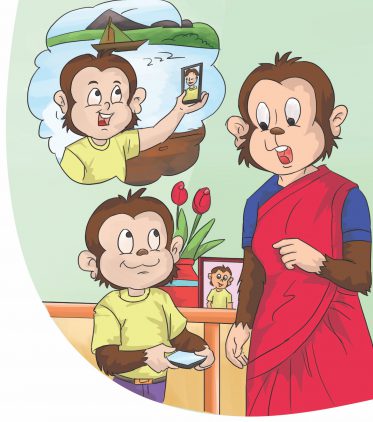
One day Monu thought of taking a selfie from the branch of the tallest tree of the forest. One could view the beauty of the whole forest from there.
He climbed the top most branch of that tree to take a unique selfie. He held the mobile in one of his forelegs, the branch with the other and posed for a selfie, hanging in the air. He was having fun clicking selfies in various poses. But the branch couldn’t bear his weight.
It broke from the tree with a loud crack. Monu fell hitting the branches of the tree, on the ground with a thud and lost his senses with a loud cry.
On hearing his cry, some animals near the tree came running there. Seeing him lying unconscious, they took him to Dr. Gajju elephant immediately.
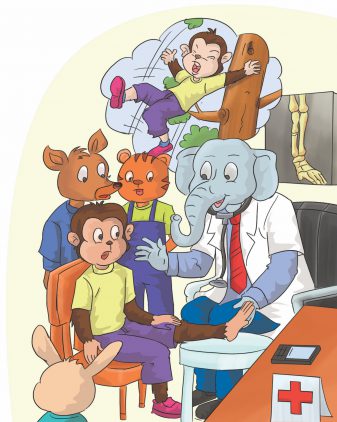
Dr. Gajju examined him and said that he was seriously injured and had fractured his legs. Monu needed to rest for two months.
Monu’s mother, too reached Dr. Gajju’s clinic. She was crying because Monu was hurt and unconscious.
Monu became conscious and realized that his mother was crying. He cried in pain and said, “Ma, please forgive me. I will listen to you and promise not to take selfies all the time. I will not touch the mobile again.”
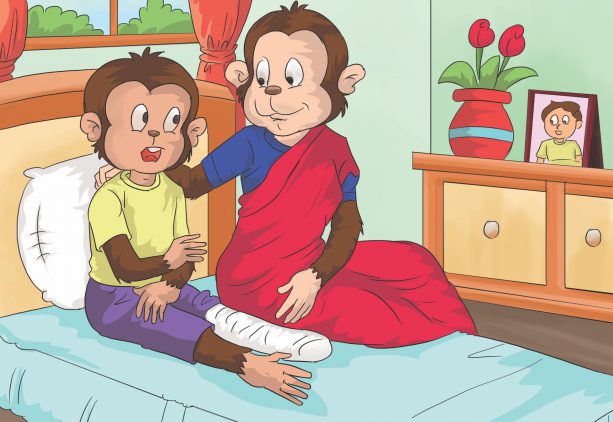
Monu’s mother hugged him and said, “My child, the mobile has nothing to do with this. You had started to misuse the mobile by putting your life in danger, by taking selfies in dangerous places. That’s why you met with an accident. You escaped with minor wounds and your life is out of danger; this is a great lesson for you.”
Monu learnt a lesson from his mother and decided to leave the addiction of taking selfies. But all his friends gathered there and took one last selfie with Monu lying on the bed, with plaster on his leg, to remind him to be careful!
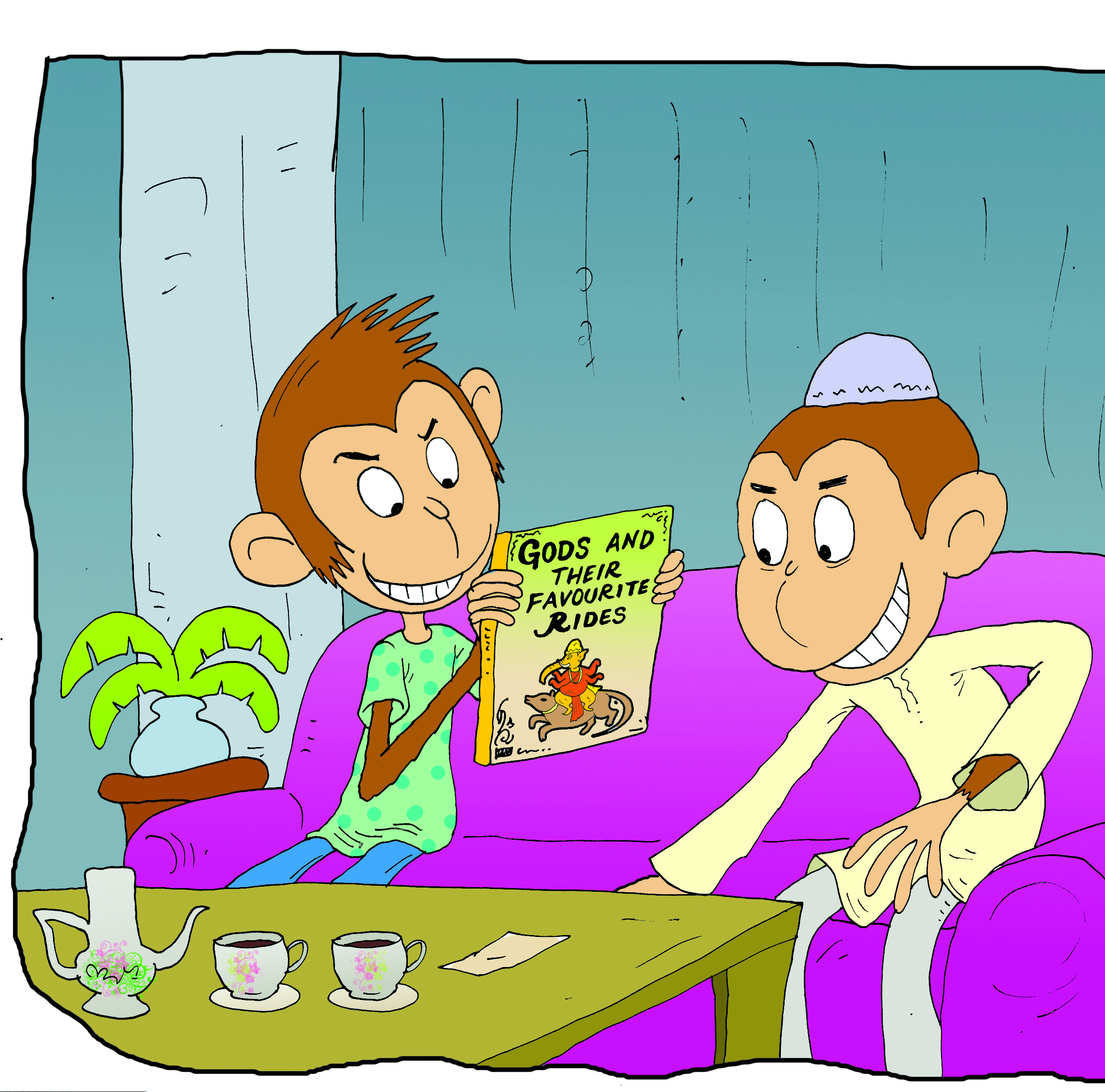
The spread of literacy in Vijayvan had not been good for Pandit Bholaram monkey’s business.
He was no longer called upon to read palms to predict the future, nor to perform rituals for good health, success in studies or before entering a new home. The animals of Vijayvan knew these practices were only so that Panditji could make money and did not guarantee the things they promised.
He shared this with his friend Bunty monkey who came to meet him.
“Business has been dull, my friend. A week has passed since I have had any customer,” said Bholaram sadly.
“Yes! Everyone has become wiser since the opening of the new library,” agreed Bunty.
“Please sit, Bunty. Let me get some tea for you,” said Pandit Bholaram.
Bunty monkey sat, looked around the room and found a book. He started reading it. The book was called ‘Gods and their Favourite Rides’. The book depicted the favourite vehicles of Gods with colourful images. He flips through the entire book by the time Bholaram comes back with tea. He suddenly thought of something.
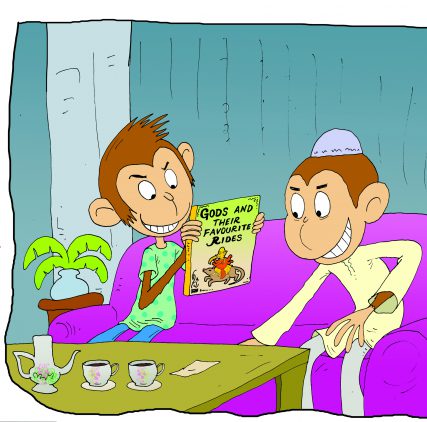
“There is another forest, a little far from here, called Devvan. The residents of Devvan are uneducated and very superstitious. Your business can thrive there,” said Bunty, taking tea from Bholaram.
Bholaram looked curiously at Bunty.
“An idea has come to my mind after reading this book!” said Bunty and narrated his plan to Bholaram, who also got excited after hearing it.
“Now, since I came up with the idea, I should be a 50% partner in your earnings. You take half and give the other half of what you earn to me,” said Bunty and Bholaram agreed.
The duo then left for Devvan. They took a house on rent there and hung a board that said: ‘Pandit Bholaram’s Obstacle Removal Centre’.
The word soon spread that a renowned ‘Pandit’ had come to Devvan and was relieving animals of their pains and problems. A huge crowd started to gather at the centre.
Motu owl heard this and came to visit Pandit Bholaram. Touching Bholaram’s feet, Motu said, “These days my earnings are not sufficient. Please suggest a way to increase them.”
“What are you saying, Motu? Such a thing is not possible! You are the carrier of Goddess Lakshmi herself! How can you suffer? This cannot happen to you!” Pandit Bholaram exclaimed before Motu could finish his sentence.
“Who is Goddess Lakshmi?” Motu enquired.
“You don’t know about Goddess Lakshmi? She is the Goddess of wealth who grants money to all. She rides on your back whenever she has to go somewhere,” explained Bholaram.
This was all very confusing for Motu. Pandit Bholaram, then, looked at his partner Bunty monkey for support. Bunty took out the book and turned some pages. He showed an image to Motu and said, “Look, this is you and this is Goddess Lakshmi riding on you for her visit to a poor man to shower her blessings.”
“Oh yes! That is me for sure! I never knew this,” said Motu, surprised.
“Worship Goddess Lakshmi and you will have so much money, you will never have to worry again,” Bunty added.
This made Motu owl extremely happy. He gave Pandit Bholaram fees for this knowledge and left from there.
Bholaram said, “Why has Lord Ganesha’s vehicle take the pain of coming here? I would have visited your house if only you had asked me.”
Bholaram’s words did not mean anything to Chuchu and he started talking about his problem, “I am having a difficult time these days. My wife and kids do not listen to me,” he said.
“This is definitely the dark ages. Lord Ganesha’s ride is having a difficult time! It is definitely not a good time,” Bholaram dramatised.
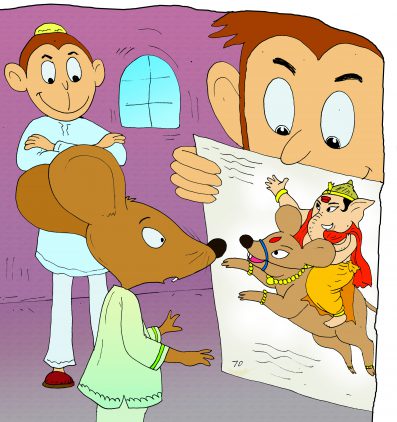
“I do not understand what you are saying about Lord Ganesha and me being his ride. Please tell me when my luck will change,” asked Chuchu impatiently.
Bunty monkey showed Chuchu a picture from his book and explained, “Look, Lord Ganesha is riding on your back, on his task to remove problems for those who worship him.”
Chuchu was surprised to see that he was carrying Lord Ganesha on his back. This made him realize how great he was!
“Keep Lord Ganesha happy by worshipping him and soon everything will be back to normal,” suggested Bunty.
Chuchu gave money to Pandit Bholaram and left from there.
“Namaste, Pandit ji!” greeted Kalu crow, who visited Bholaram next. “I never get a successful result in any work I do. It seems as if there is an adverse influence of Lord Saturn on me.”
“Lord Saturn can never affect you adversely! You are his ride! He can never let this happen to you!” Bholaram faked surprise.
Like always, Bunty took out his book and showed Kalu an image of Kalu carrying Lord Saturn.
“Look it is you who is carrying Lord Saturn! The Lord does not have wings to fly and he would be helpless without you. You should go and pray to him and you will be taken care of,” said Bunty.
They suggested Ballu ox to pray to Lord Shiva, Meenu peacock to pray to Kartikey’s, Hansraj swan to pray Goddess Saraswati’s and Golu eagle to pray to Lord Vishnu, as these gods rode on them and advised them to worship their respective Gods and said, “Your luck is going to change very soon. After all, these Gods have to help their rides.”
Now, Chuchu mouse, Motu owl, Kalu crow, Ballu ox, Golu Eagle to Meenu peacock, and others started worshipping their respective Gods. They believed that they would soon become wealthy if they succeeded in pleasing their Gods.
After several days of praying when none of them got the desired results they went back to Bholaram and complained, “Pandit ji, we have been worshipping our Gods day and night but we have not been rewarded.”
The gathering of a huge crowd made Bholaram nervous. But the clever Bunty immediately came up with an idea and said, “Don’t worry, my friends! If you haven’t succeeded in the simple method of prayer, then, we will switch to a different and more complicated method. About five kilometres from here, there is a river. On its banks is a tree. You should go there and start a hunger strike. Your strike will make the Gods helpless and their work will come to a standstill. They will not be able to travel from one place to another,” claimed Bunty.
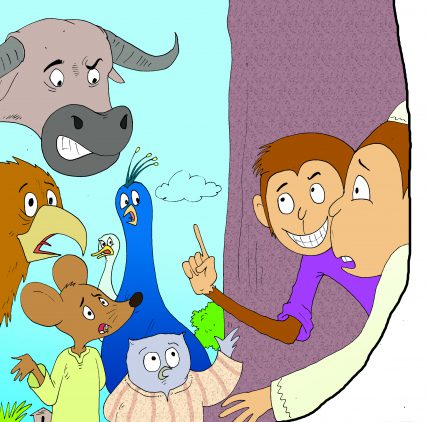
All the animals followed Bunty’s advice and went to the river bank and sat under the huge banyan tree in a hunger strike. Two days passed but no God or Goddesses came to their rescue.
Rocky rabbit of Vijayvan was visiting Devvan. He was riding on Grandpa elephant’s back. Grandpa elephant was tired as he had been walking continuously and wanted to rest, so they stopped near the banyan tree.
“Rocky, let us rest here for some time and have our food too,” said Grandpa elephant.
Rocky got down from Grandpa elephant’s back. Looking at the crowd gathered there Grandpa elephant said, “What is this? It seems like the whole of Devvan is gathered here!”
“Can’t you see, we are all on a hunger strike? We will not eat or drink anything until God appears to help us,” Kalu crow replied.
“I am Lord Ganesha’s vehicle. Let me see how Lord Ganesha moves out of his house without me,” Chuchu said proudly.
“I carry Goddess Lakshmi around. The Goddess flaunts herself when she sits on me. Let me see how she manages without me,” Motu owl added.
Grandpa elephant and Rocky rabbit understood that animals had been fooled. He noticed that the animals had become very weak from hunger. They were not able to speak properly. Grandpa elephant picked the food kept on his back with his trunk and brought it down. The sweets and the fruits made the animals hungrier. He invited them to eat the food.
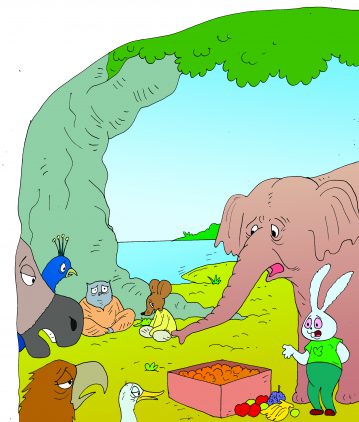
“No, we are on a hunger strike,” they said together.
“But you all are the vehicles of the Gods and you are on a hunger strike! How will they come to you if they do not have their rides with them?” asked Rocky.
The animals looked at each other and said, “That makes sense! If we are not with them, how will they come to us?”
But Ballu was suspicious and said, “I think this is a way to disrupt our strike.”
Rocky knew the animals would not survive if they were not fed immediately. He thought hard and came up with an idea.
He pointed towards Grandpa elephant and said, “He is Eravat-Lord Indra’s vehicle. Your prayers have made Lord Indra happy and he has sent this food with him. But if you all do not wish to eat, we will inform King Indra that.”
Before Rocky could complete his sentence, the animals jumped at the food and polished it off. They felt stronger after eating the food.
“We were not aware that we are vehicles of various Gods till Pandit Bholaram and Bunty monkey told us that we are important as we are the vehicles of Gods,” said Motu owl. On hearing Bholaram and Bunty’s names, both Grandpa Elephant and Rocky rabbit were surprised.
“Chuchu, please help me pick up this empty box of sweets and throw it,” said Grandpa Elephant after a little thought.
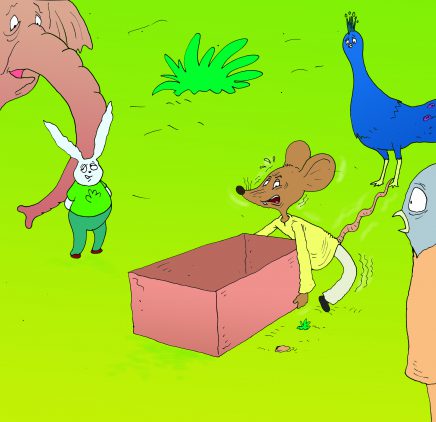
Chuchu mouse came and tried to pick up the box but he couldn’t move it.
“Try harder! You claim to carry Lord Ganesha across the universe on your back, so this should not be difficult for you,” said Grandpa elephant.
Chuchu mouse was embarrassed.
Rocky then asked Motu owl, “Can you throw this box outside?”
“Where is the box?” asked Motu looking around but he could not see the box.
“It’s day time. I cannot see anything when there is sunlight. Let the sun set and it become dark…” he said, trailing his sentence.
“What if Goddess Lakshmi has to go somewhere during the day?” asked Rocky. Motu had no answer.
“Pandit Bholaram has fooled you! You are not the vehicles of Gods and no one will help you succeed if you give money to such pandits. Success can only be achieved with hard work,” explained Grandpa elephant.
Meanwhile in the jungle, Pandit Bholaram and Bunty were busy packing their stuff and getting ready to run away.
Grandpa elephant took all the animals to Pandit Bholaram and Bunty’s house where they saw the duo dividing the money they had earned amongst themselves.
On seeing Grandpa elephant, Bholaram and Bunty understood that they had been caught and returned the money they had charged from the animals.
Grandpa elephant and Rocky rabbit then left for Vijayvan. On his way back Grandpa elephant thought, “We need to open a school and library here, so that the residents of Devvan cannot be fooled easily and keep books that will help them think for themselves.”
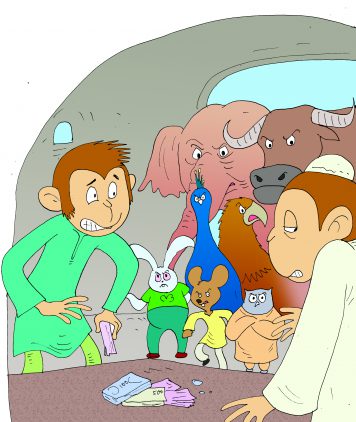
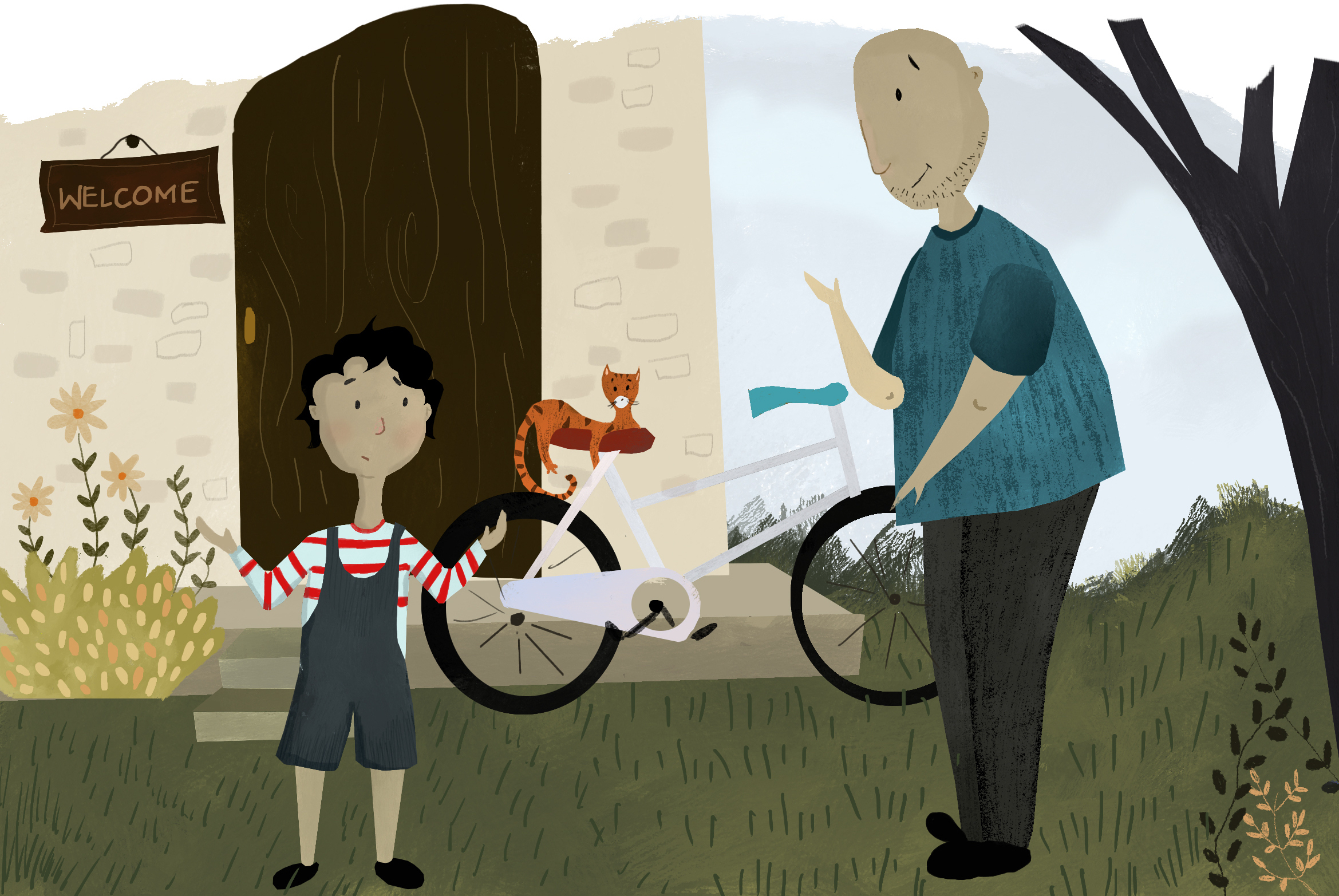
Atul’s old bicycle was too small for him. He had problems riding it, as his legs were too long for the bicycle and would ache. He had been asking for a new bicycle from his father, who was not getting time to buy one.
Atul played badminton on weekends and all his friends came to the court on their cycles. But he had to walk. He, too, wanted to cycle to class like his friends.
At last, his wait ended when his father gifted him a new bicycle on his birthday.
“This Saturday, I too will go for badminton class on my new bicycle,” he said excitedly.
“Not so soon, son. This new bicycle is a bit big for you. Your legs don’t reach the pedal properly. Practice for a few days and then ride it,” father explained.
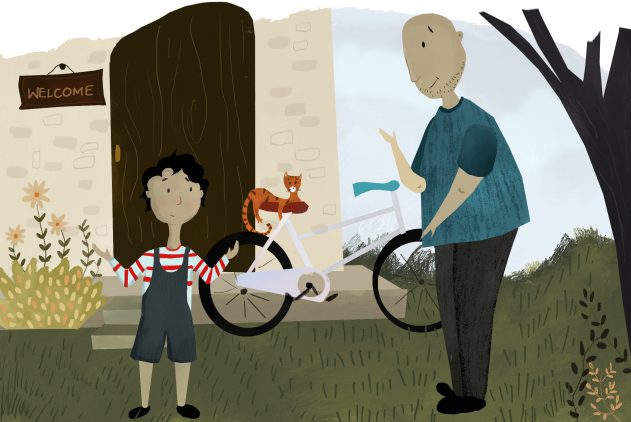
“But didn’t I ride my old bicycle well? My class is just 2 kilometers away and there is no traffic on that road. I want to go on my new cycle,” Atul insisted.
“You are right, son. But the road to your class is steep. Unless you have full control on the cycle, you may fall. So, practice for a few days near the house and then cycle to class,” father advised.
Atul didn’t say anything but he didn’t like what his father said. ‘I am 10 now but they always think of me as a child,’ he thought to himself.
On Sunday, Atul’s father’s friend came to visit them. Father was talking to him and mother was preparing tea and snacks. Seeing everyone busy, Atul took a chance and took his new bicycle and left for the badminton class.
While placing his racquet and water bottle on the bicycle, he dreamt of being a famous player.
After riding for a short distance, Atul lost his balance, as his legs couldn’t reach the pedals properly and went into a hedge. He and the bicycle, both, fell down. Atul got a minor scratch on his leg. But he still wanted to ride his bicycle to class. He picked up the bicycle. Its handle had got bent, but he didn’t go back and rode to class.
Atul hummed as he rode. The road became steep and he put all his energy and pedaled the bicycle uphill.
When the road sloped down, instead of applying brakes, Atul got scared. The bicycle raced fast down the road. Another man was coming on his bicycle from the opposite direction. Atul wanted to stop the bicycle but couldn’t because of the slope and collided with the man coming from the opposite direction.
Both the riders fell down with their cycles. Atul’s bicycle fell on top of his leg. His leg hurt. His racquet and water bottle lay on the road. The man with whom Atul collided was bringing milk, bread and eggs from the market. The eggs broke and the milk spread on the road.
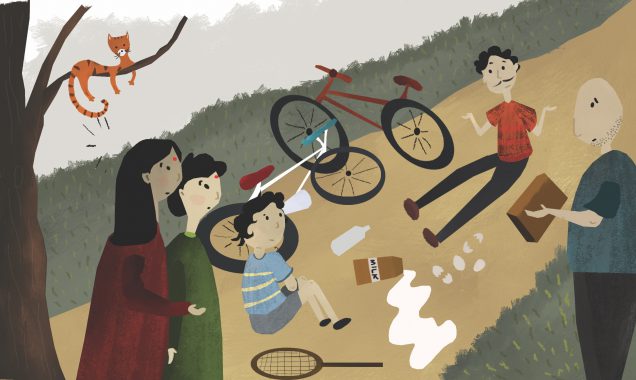
Standing up, the man said, “If I go home without these things, I will get a scolding. I don’t have money to buy them again,” he cried.
Now a crowd gathered around them. Someone asked Atul’s parents’ phone number and called them who came there quickly.
Seeing the whole situation, Atul’s father understood what had happened. Atul was scared to face his parents’.
Atul’s father gave money to the man to buy the things again.
Atul’s racquet and the new bicycle both were bent. His leg had swollen by the time they reached home and his parents had to take him to the doctor.
The doctor said that Atul had sprained his muscles and gave him medicines and asked him to put hot and cold water bags on his legs.
Atul could neither play badminton nor go out to play for 3 weeks. He apologized to his parents and promised to understand when to try new things.
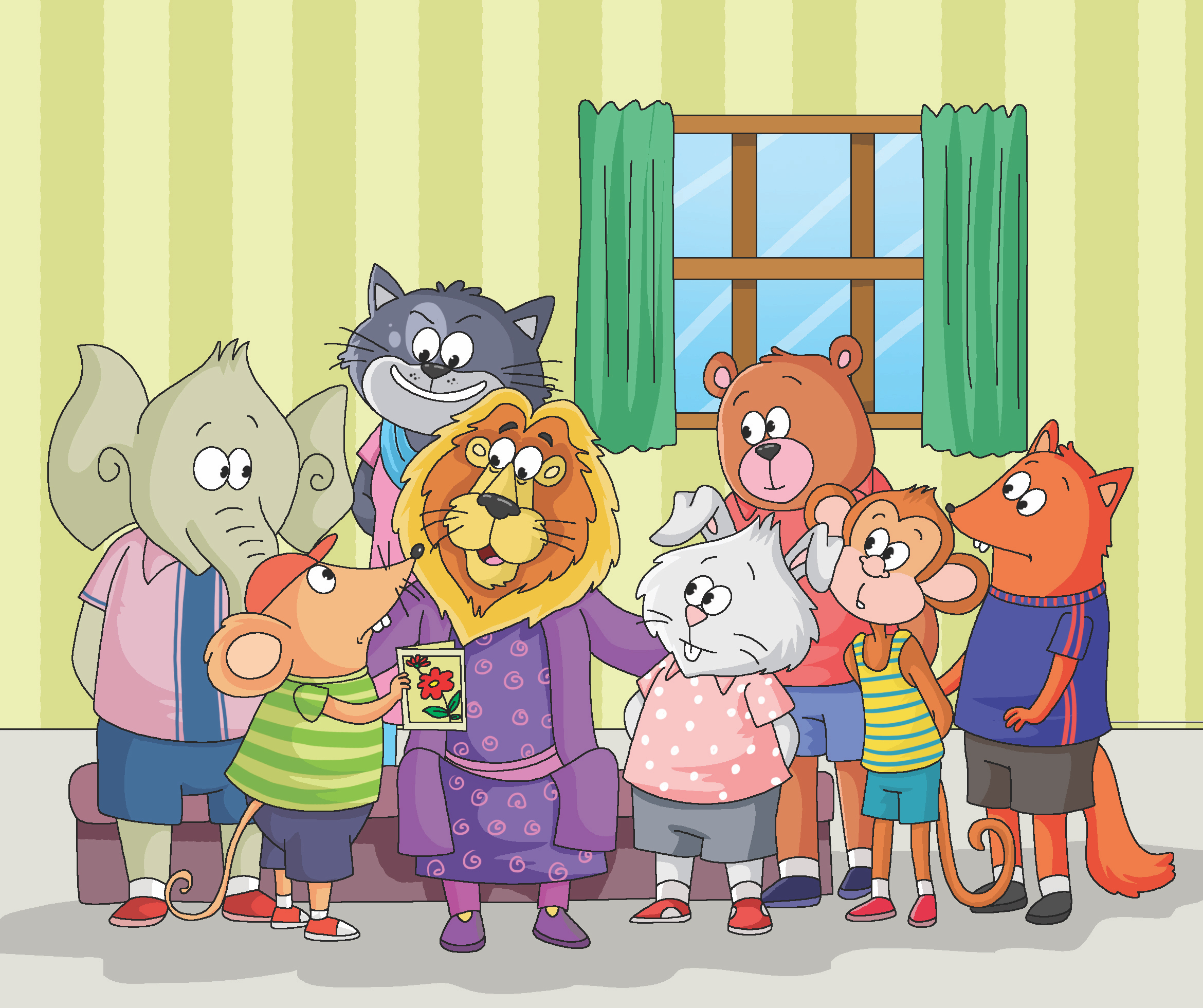
Champakvan had an orphanage devoted to the care of orphans. It was home to a lot of children. The boarding, lodging and studies of these children was completely undertaken by King Shersingh.
Shanno cat was employed as the caretaker of the orphanage.
King Shersingh visited the orphanage once a month.
One Sunday, when Shersingh reached the orphanage, Shanno was waiting for him at the gates to welcome him.
“Shanno, I hope the kids are well taken care of?” asked Shersingh.
“Yes, my King! I take care of them like my own kids. I am at their service throughout the day. I am always concerned about them,” replied Shanno.
“My King, I request you to come and see for yourself how well these kids are taken care of,” she continued taking Shersingh to the kitchen.
Lunch was being prepared in the kitchen. There was chapati, rice, dal, vegetables and rice pudding on the menu.
“This food smells good here!’ said Shersingh, taking in the aromas of the food.
“Yes, my king! We serve tasty and nutritious food to the kids every day. They are also served milk, nuts and fruits in the morning,” Shanno added.
“That is excellent! I wish that these kids never face any inconvenience while they are here. Let me know if you need any help,” offered Shersingh.
Then, Shersingh visited the kids in their rooms. Cheeku rabbit, Meeku mouse, Jumpy monkey and the other kids greeted the King.
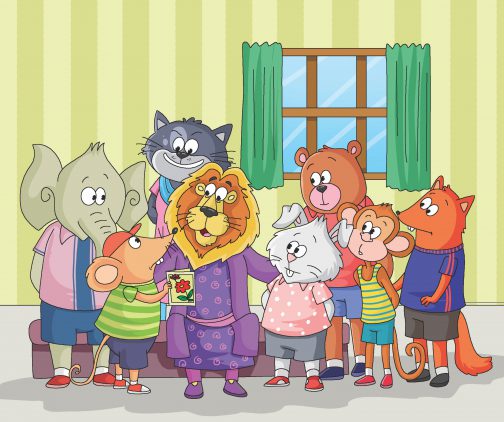
“Children, are you all comfortable here?” asked Shersingh.
“Yes!” said the kids and nodded.
“My King, like I said, the kids here do not have any problems. We care for them like our own kids. Each and every need of theirs is taken care of,” Shanno added quickly.
As soon as Shersingh got up to leave, Cheeku interrupted and said, “My king, we have made a greeting card for you and we would like to present it to you.”
Shersingh happily accepted their request and said, “Yes, of course! Bring it quickly. I want to see what my lovely children have made for me.”
Meeku brought the card and presented it to Shersingh.
Shersingh opened the greeting card and smiled and said, “It is a very beautiful card. I have never been presented with anything like this before. I will always treasure it.”
“Shanno, you are working really hard to help these kids. You deserve a reward for your efforts. I will return soon,” said Shersingh as he left.
That night Shersingh visited the orphanage with Inspector Tommy Dog and his team.
Shanno was surprised to see Shersingh with the police. She came out quickly and asked, “What is it Inspector? Is there a thief here?”
“Yes, we are here to catch a criminal. A crime has been happening for many days and now we have the proof for it,” said Inspector Tommy and hand-cuffed Shanno.
“Why are you taking me in, Inspector? What crime have I committed? I look after the kids in the orphanage. I am not a thief,” cried Shanno.
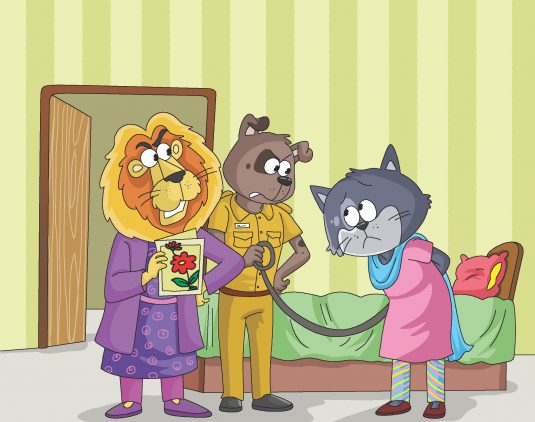
“You should be ashamed of yourself! I trusted you and you took advantage of my trust. Now you will spend the rest of your life in prison,” roared Shersingh, his eyes red with anger.
“My King, there is some misunderstanding. I have not done anything. Please leave me!” pleaded Shanno.
“There is no misunderstanding. The children of the orphanage gifted me the card and it mentioned all the details of your wrong doings. You have been torturing these little children by hitting them and threatening them. How you fed them stale food that too, just once a day.
All the food that was being prepared was just to fool me. You have been keeping all the money that was sent for the welfare of the kids, for yourself. Your misdeeds have finally come to light now,” Shersingh growled.
Seeing his rage, Shanno admitted to her crimes. Shersingh demanded a tough punishment for Shanno.
Then Shersingh praised Cheeku, Meeku and Jumpy for their presence of mind and said, “We were able to uncover Shanno’s wrongdoings due to your intelligent thinking. I assure you, that you will never face such a problem again. You will all be looked after well!”
Shanno was sent to prison and the children lived happily with another caretaker.
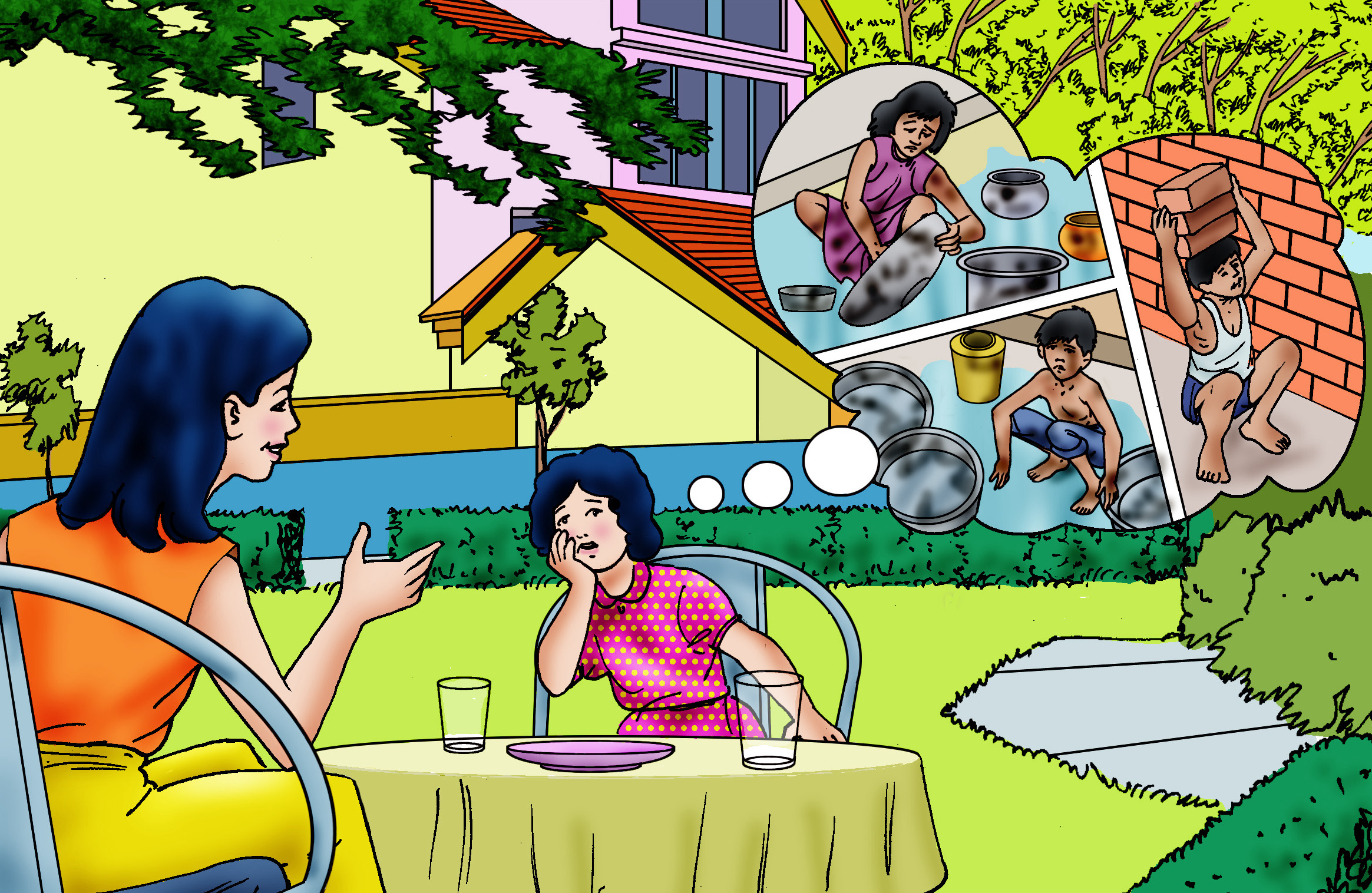
Myra was sitting deep in thought that afternoon when her elder sister, Mandira, who was studying law came into their room. Seeing her sister sitting quietly, Mandira asked, “What’s the matter, Myra? What are you thinking about?”
“In school today, we were given a topic, ‘Anti-child labour Day’. We have to collect and share information about this day. We also have to paste some pictures. Didi, you are studying law. Do you know about ‘Anti-child labour Day’?” asked Myra.
“Yes, sure! But let’s eat our food first, and then we’ll talk,” replied Mandira.
After lunch, Myra cleaned up and went with her sister to sit on the lawn in front of their house. Her sister pulled up two chairs at the table. Mandira had carried fruits and milk as an afternoon snack for them.
“The International Labour Organization-is an international body formed to study and talk about labour. It started the ‘Anti-child labour Day’ in the year 2002. Many people take work from small children under 14 years. This is called ‘child labour’. Children are kept as servants in homes. Some children are employed in shops, hotels and garages. Children clean and wash cars. Some children are employed in hazardous jobs like mining; though this has become much less these days. In the olden days this was more common,” said Mandira.
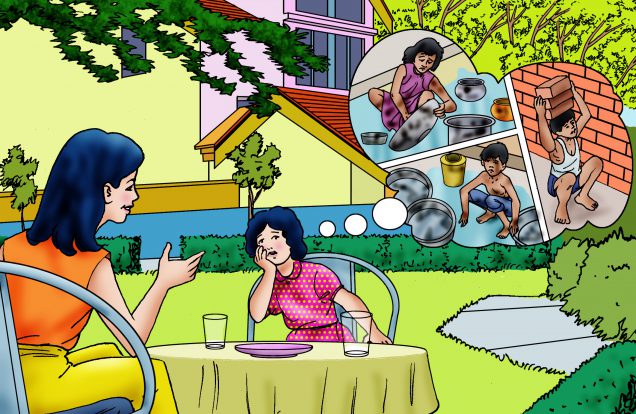
“But why do people take work from small children?” asked Myra. “There may be some compulsions for these children, like they may be poor and may require money. Also, people pay less to small children and hence, don’t mind employing them,” replied her sister.
“But didi, then how do these children go to school? And what about their life, like play and games. What about those activities?” asked Myra.
“This is the objective of ‘Anti-Child Labour Day’, so that we recognize rights of children. Every child has the right to go to school, to play and enjoy life. We cannot deny them these rights by employing them for work. Childhood has a great impact on a person’s personality. The people who employ them often do not treat them well. For their small mistakes, they shout at them. Very often, they beat them. That is why Anti-child labour day is celebrated,” explained Mandira.
“Didi, after hearing you, I just remembered one thing. Near our school there is a hotel. I have seen a small boy working there,” remembered Myra.
“Really? Tomorrow I will come to pick you after school. Then we will go to the hotel and meet the boy. In the meantime, you can use the information I shared with you and prepare your report. I will help you download pictures from the internet or take them from magazines,” said her sister.
Next afternoon after school, Mandira and Myra went to the hotel. They saw the boy cleaning tables and serving food to the customers.
Mandira asked the hotel owner, “Who is that boy?” The hotel owner replied, “He is Ram, my elder brother’s son. My brother who lived in the village passed away last year. His mother also lives in the village. His education cost had increased and she was unable to meet the expenses. So I brought him here. He goes to school in the morning and helps me with my work in the afternoons. In the morning my wife stays here to help me. But she has the house to look after. So, Ram helps me take good care of the hotel.”
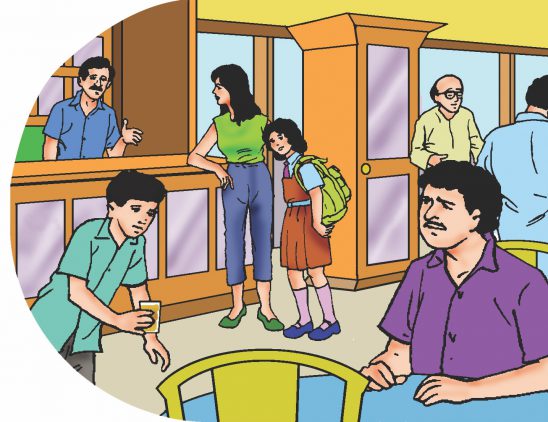
Mandira said, “You brought Ram to study here. That is very good. But along with the studies you are taking work from him and this is wrong. Do you pay him? Does his mother know all this? It is a crime to take work from him. From tomorrow you must stop asking him to work for you.”
Then the hotel owner said, “How does this matter to you? He is my own nephew. His mother will not say anything.”
“You are snatching his childhood from him. He needs rest after coming from school. Besides, he needs to complete his homework and studies. And for him play and games are also necessary. His childhood will not come back,” insisted Mandira.
The hotel owner then said, “Alright, didi. From tomorrow I will not take work from him.” They saw a smile on Ram’s face.
While going away Myra told her sister, “At least, Ram benefited from my project.” “Yes!” said Mandira and they returned home happily.
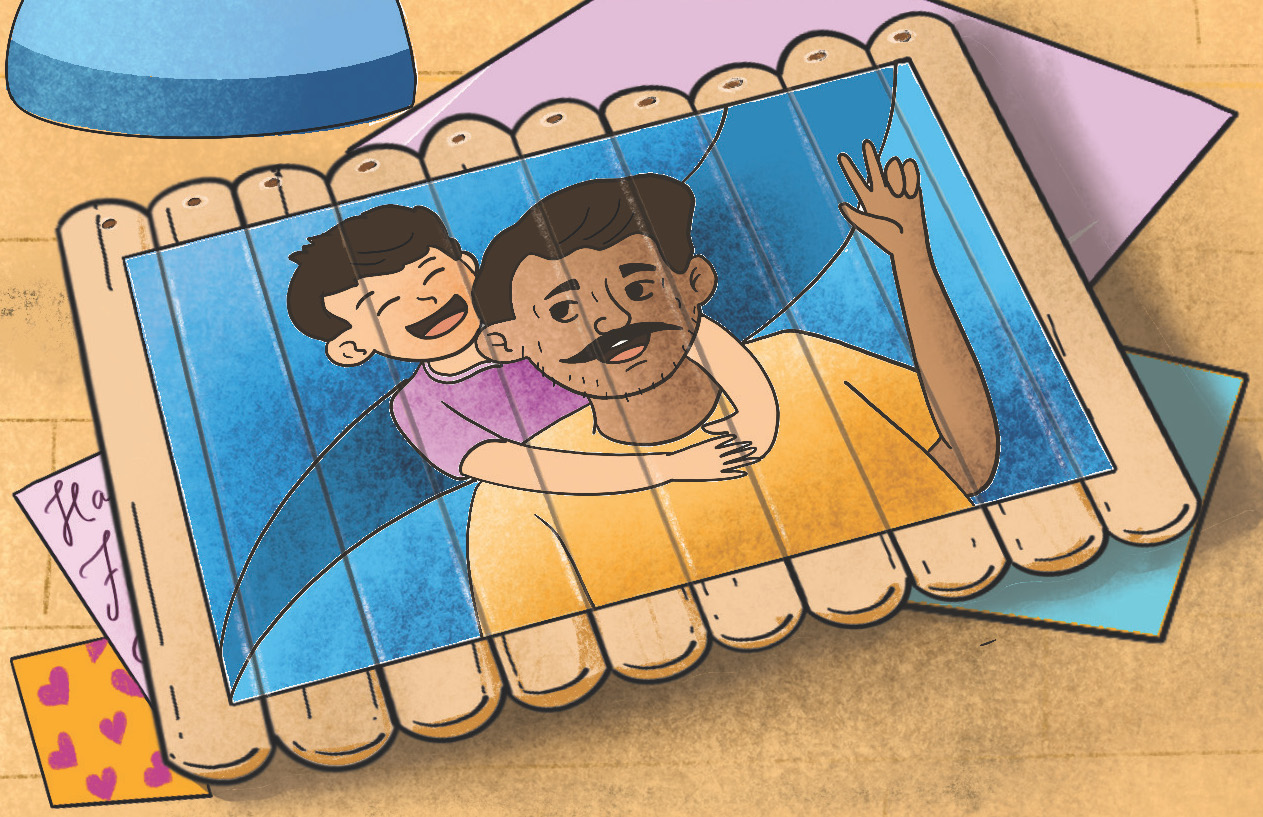
Make an easy Popsicle Stick Puzzle Gift!
Materials Required:
Steps to make:
1. Arrange the popsicle sticks as shown and paste the photograph with your father. With the help of an adult, pierce a hole using the nail at one end of these sticks.
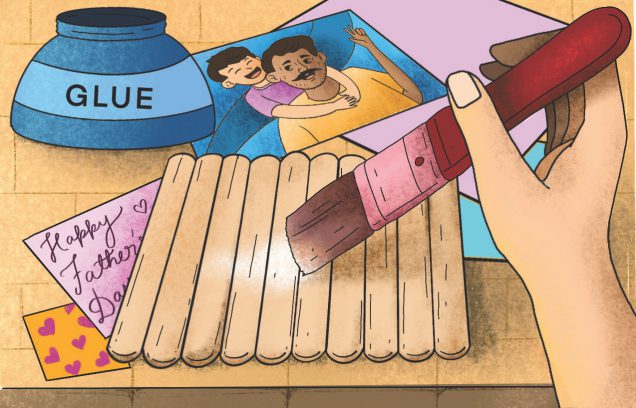
2. Let it dry for 20 minutes. Use a cutter to carefully split the sticks apart.
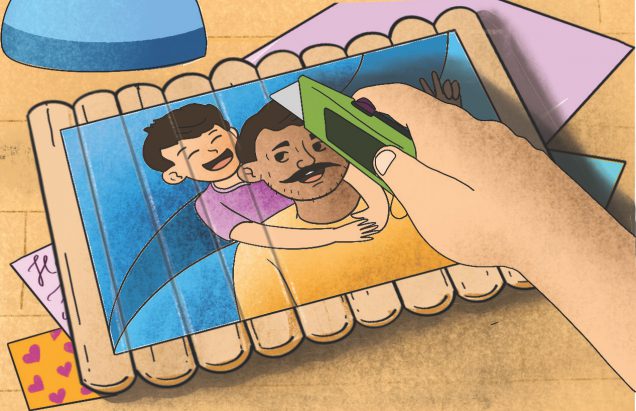
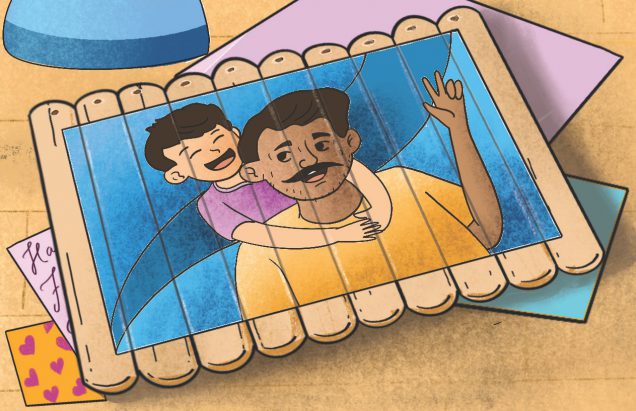
3. Using a thread, jumble and tie the pieces of the puzzle together. Attach a small card that says “Happy Father’s day” in the front.

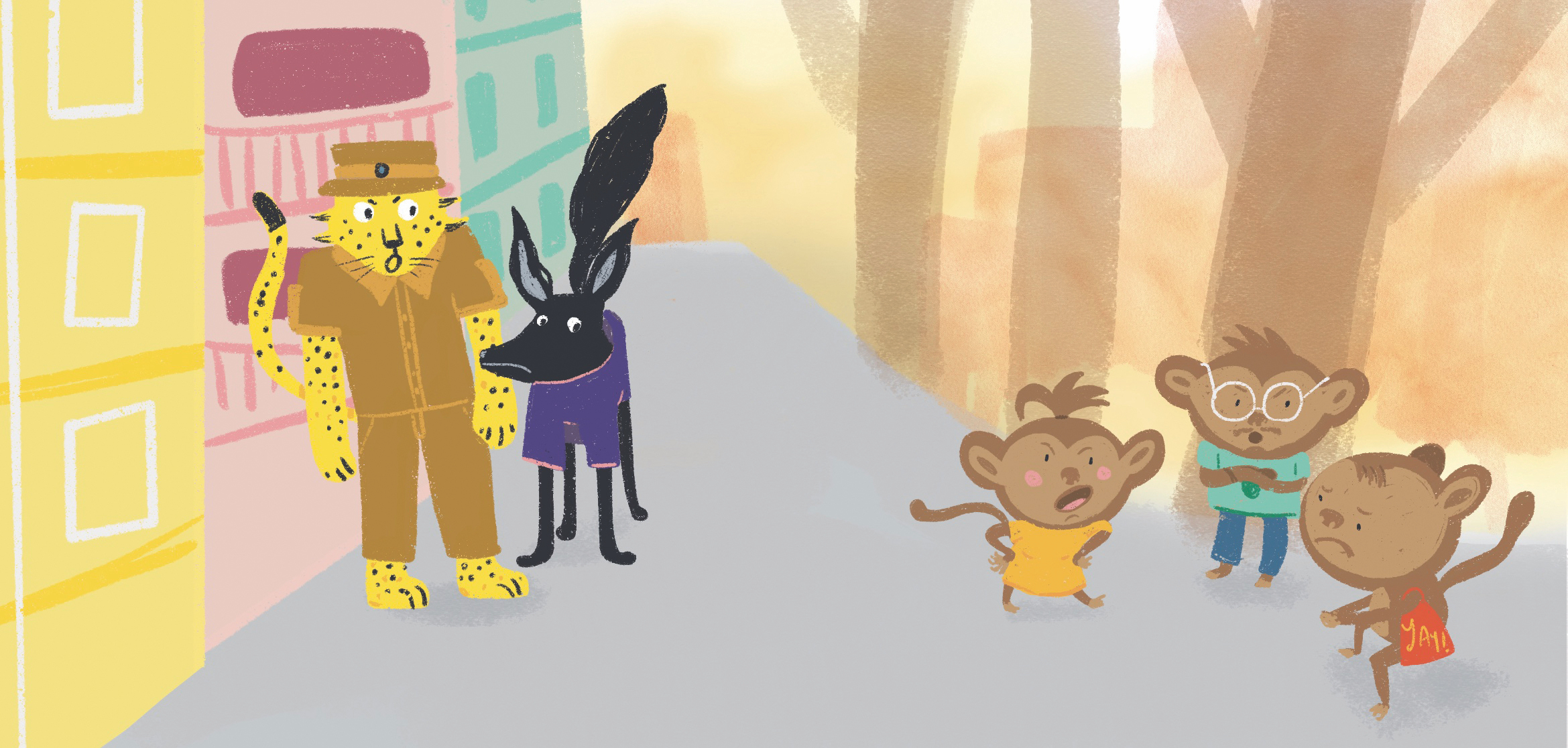
Charlie monkey was a chatterbox. Unlike the others in the forest, his hobbies did not include painting, drawing, sports, or music. Instead, he loved to just keep talking.
He would start talking wherever he went. All he needed was a reason, and he would start telling the whole story. His parents and teachers were frustrated with this habit. They tried explaining to him, “Don’t talk so much! Think before you speak! If you keep talking unnecessarily, you will get into trouble.”
But to no avail. Charlie hardly listened to any advice.
One day, a few guests arrived at Charlie’s house. His mom sent him to the market to buy samosas and told him, “Come back quickly! Don’t get distracted by talking!”
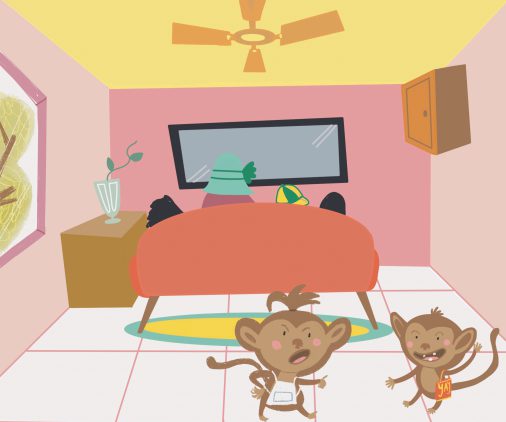
“All right!” said Charlie and left for the market.
He placed his order and was waiting for his turn when Jojo jackal, who was also standing at the shop, noticed him and said, “Hello! Are you Mukesh’s son?”
That was all the reason Charlie needed.
He said, “No, uncle! My father’s name is Manohar, and mine is Charlie. I study in fifth standard in Jungle Public School.”
Jojo said, “Oh, yes! I’m sorry! I know your father, too. He’s a great guy! I want to meet him.”
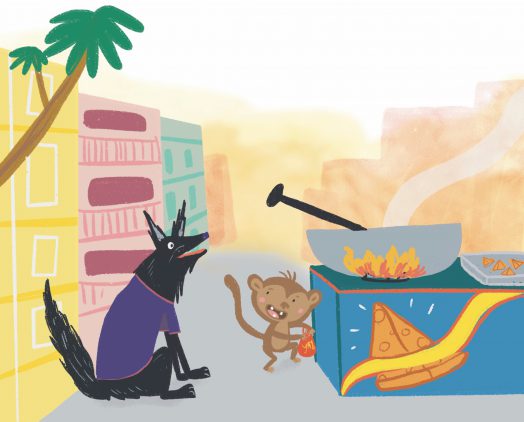
Charlie started again, “Of course, uncle! My dad is a big businessman. The shop ‘Jungle Electronics’ in the main marketplace belongs to us. You can buy the latest refrigerators, televisions, washing machines and air conditioners in our shop along with imported gadgets. You have to go to the shop to make a purchase, but you won’t be able to meet my dad. He will be going out of town for a few days, and the shop will be closed.”
Then Charlie remembered that there were guests at home, and his mom was waiting for him. He took the samosas and rushed home, but the guests had already left by then.
Mom was furious. She said, “There you are! Why did you come back so late? Did you find someone to talk to? Now, eat the samosas yourself! The guests have left!”
Charlie was apologetic and said, “But I was not talking in vain, mom! I met an uncle at the shop who knew dad and wanted to meet him.” And he recounted his conversation with Jojo uncle.
His dad got upset after listening to his story. Charlie thought that his dad would scold him. But his dad left the house at once. Then Charlie went to his room, thinking that the matter was over.
The next morning, when Charlie was getting ready for school, the doorbell rang. Charlie’s mom answered the door, and Inspector Cheetah Singh was standing outside. Two other policemen were holding Jojo as a prisoner.
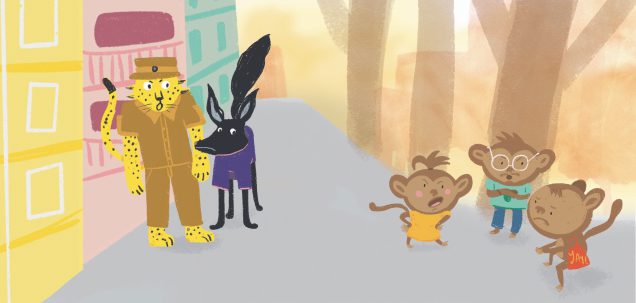
Seeing Jojo, Charlie said, “Oh! This is the same uncle I met yesterday! He wanted to meet dad!”
“He’s not your uncle! He’s a crook! He collects information about big businessmen and their whereabouts and robs them after finding an opportunity. We’ve been looking for him for a long time. Finally, we caught him,” said the inspector.
Charlie was shocked, and he said, “I thought he needed help. So, I told him everything…”
“But you tell everything to everyone! You never think twice about how much you should share and with whom. When I heard your story yesterday, I realised something was fishy. So, I alerted the police immediately. That’s why we are safe. Otherwise, your ‘Uncle’ would have robbed the shop,” said dad.
Charlie’s dad thanked Inspector Cheetah Singh for his timely action. The police left, taking Jojo away with them.
For the first time, Charlie regretted his habit of excessive talking, which could have resulted in a huge loss for them. His eyes welled up with tears. He promised his parents that in the future, he would never speak without thinking.

There was silence all around. Streets were deserted and parks, abandoned. No one could be seen on the roads. It seemed like all humans were holed up inside their houses.
The black smoke from the skies had disappeared and the air was less polluted. Rivers, too, were cleaner than before.
The animals of Champakvan couldn’t understand what was going on. They were called for a meeting by Blacky bear in the morning on the banks of Crysty River.
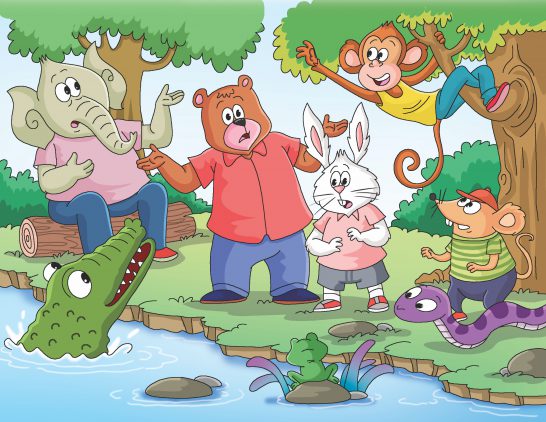
After greeting everyone, Blacky asked, “Where are the humans? What has caused this sudden change? Why do all the cities look deserted? What has caused the noise and air pollution to reduce?”
Blacky Bear asked many questions and looked at the other animals for answers.
“I have heard that a disease has taken over the cities, villages and towns. It is forcing the humans to stay in their houses,” said Jumpy monkey who had returned from the city last week.
“What kind of a disease? How can a disease cause the cities to shut down?” asked Jumbo elephant.
“I do not have much information. It is just something that I heard from somewhere,” replied Jumpy.
“Our water is cleaner too. It seems like nobody is working at the factories as the water is not as dirty as it used to be,” said Wooky alligator, popping his head out of the water.
“It surely means that something really serious has happened, otherwise humans don’t change so easily,” Elvy python added.
“Yes, Rocky rooster also told me that humans don’t come out of their houses even after the morning rooster call,” said Cheeku rabbit.
After listening to all of them, Blacky took some time to think and then said, “We should try and find out what is happening. I hope this silence is not a warning for some kind of danger approaching our forest. Let’s find out if this is a conspiracy against us. We should send someone from our forest to the city.”
“Meeku mouse can go. He is fast and small and can enter any house,” said Dumpy pig.
“Yes, I agree. Meeku will be good for this job,” added Dodo Peacock.
“Can you do it, Meeku?” asked Blacky. “Sure, I can. It will be my pleasure to be able to do something for our forest,” replied Meeku and left for the city immediately.
On reaching the city in the afternoon, he noticed that many shops were shut and very few people were on the roads wearing masks. He went inside one of the houses and saw a family watching television.
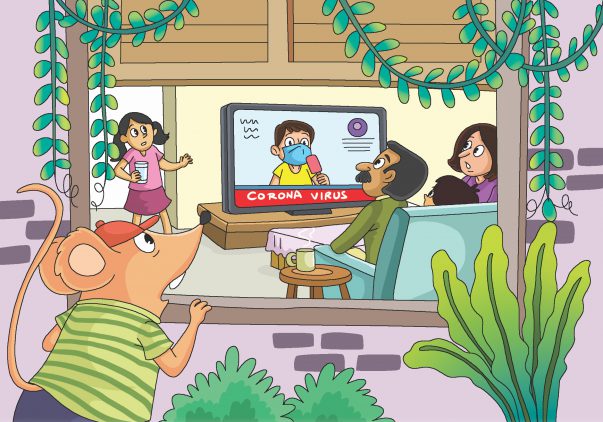
A news programme was announcing the rising number of cases and listing the precautions people should take. Meeku left from there and entered another house.
Here, the television was on but no one was watching. He heard the news host saying, “Coronavirus is spreading fast. Those who have symptoms like runny nose, cough or fever should report immediately. An infected person needs to maintain distance from others. People should stay at home and only step out to buy essentials.”
Meeku went into yet another house where he saw a little kid drawing and talking to his grandfather.
“Grandpa, how do you like my drawing?”
“Wow! Karan, this is lovely. You have shown how all the animals are roaming freely and humans are sitting at home,” said grandpa.
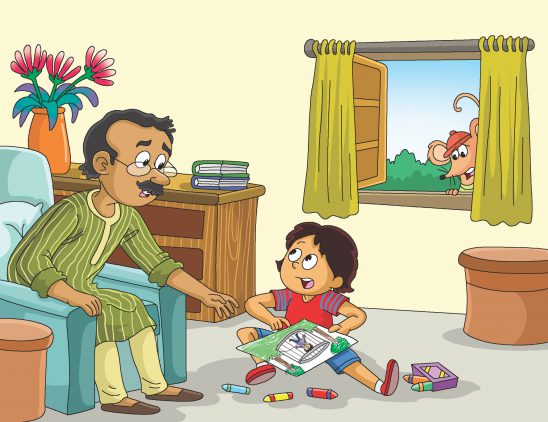
“It’s true, grandpa. Now, humans are locked in cages while the animals are merrily roaming outside. They are free and not afraid of any virus. When will this coronavirus leave us, grandpa?” asked Karan.
“My dear Karan, until we find a vaccine that can save our lives, we have to follow certain rules of maintaining social distance, washing our hands regularly and eating healthy food. We cannot stop the virus but we can stop it from spreading and hope that this pandemic gets over soon,” explained grandpa.
“Why is it called a pandemic, grandpa?” asked Karan.
“Because it is a disease that has spread to all the countries in the world,” replied grandpa.
Meeku understood the situation. He left the house and ran towards the forest. Another meeting was called in the forest where Meeku explained the whole situation to everybody in detail.
He told them, “Champakvan is not under any threat. It is the humans who are facing a threat from a disease called coronavirus. Let us hope they learn something from this situation.”
This eased the unknown fear that the animals of the forest felt. They hoped that the helplessness the humans faced goes away for good.
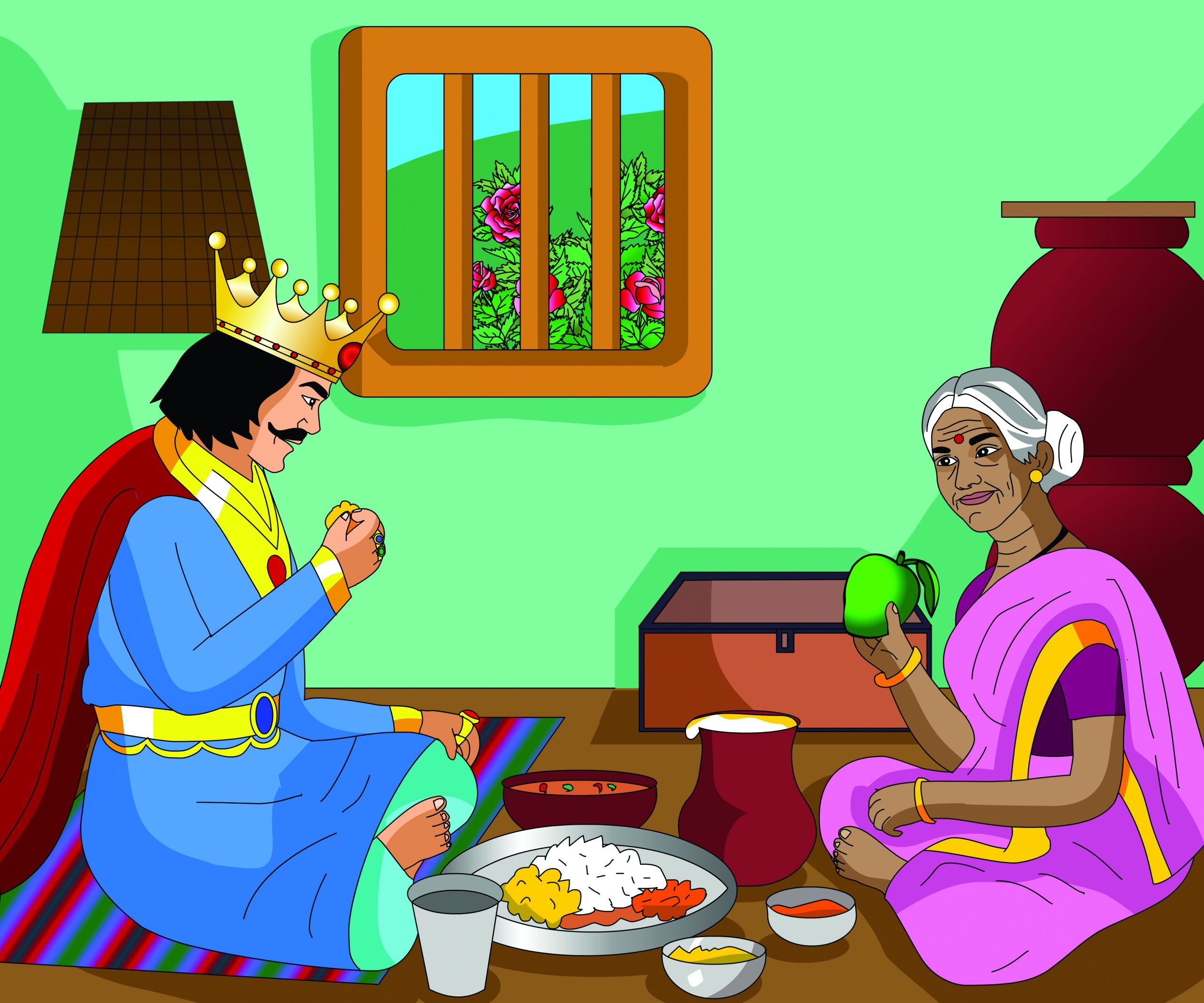
Once upon a time, there lived a King named Leonar who loved eating delicious food. He would send messengers to different kingdoms in search of recipes and special ingredients.
When his messengers returned, King Leonar would give those recipes and special ingredients to his cook and ask him to make those dishes. If the dishes were good, he would reward his cook, but he would punish his cook if he didn’t enjoy the taste of the dishes.
“Make many dishes. I want to taste all of them! Don’t forget to add the exotic ingredients and lots of dry fruits and nuts to all desserts,” the king ordered.
“But Sir, some dishes will lose their unique flavour if we add all ingredients to them! Sometimes, simple recipes are tasty,” the cook replied.
King Leonar was displeased with such words and ordered a harsh punishment for the cook.
The cook could not leave the palace because King Leonar kept guards to keep an eye on him as he was the best cook in the whole country. The poor cook was tired.
One day, King Leonar went hunting and got lost. The soldiers tried to find him but failed.
For once, the cook was happy. He cooked lovely dishes with simple ingredients everyone in the palace enjoyed them.
Meanwhile, King Leonar, after walking for a while, reached a hut in which an old lady lived. He was hungry and tired.
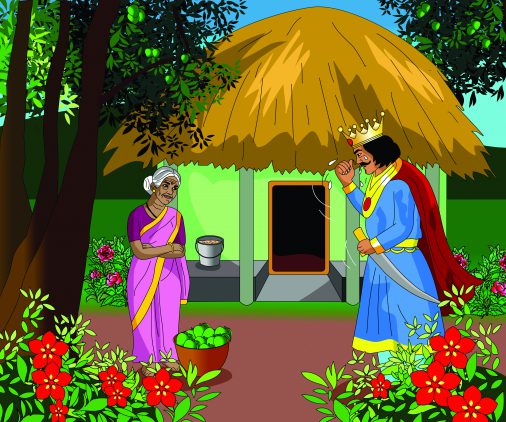
He wanted a good meal and said, “Hello, I am King Leonar of the country. Make me a delicious meal and I will reward you.”
The old lady smiled and welcomed the king. She had a mango tree in her garden and luckily, it being summer, the tree had lots of fruits on it.
She arranged a cot under the tree for the king to rest and served him a glass of aam panna. King Leonar sipped it and exclaimed, “Wow! This is delicious! What is it made of?”
The old lady replied, “Raw mango, salt and pepper.”
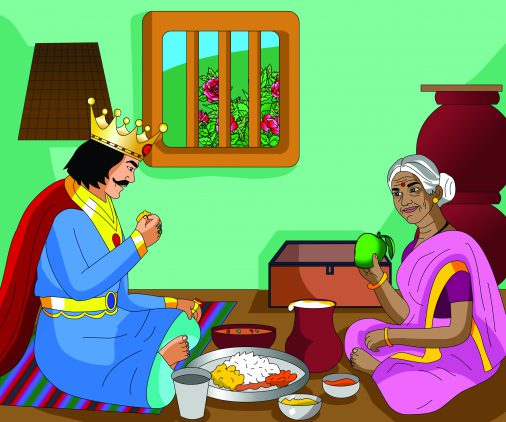
King Leonar was surprised that such simple ingredients could bring out such a unique taste. And so thinking, he dozed off to sleep.
The old lady continued cooking. After a while, King Leonar woke up to delicious aroma coming from the kitchen. He was eager to taste the dishes.
The old lady served King Leonar hot rice, a ladle of ghee, mango chutney, mango dal and mango rasam.
King Leonar relished each bite and kept asking her for the exotic ingredients that she had used.
But the old lady said, “Your majesty, I am poor and cannot afford exotic ingredients. I use the mangoes from my tree and cook whatever I can. I am glad you liked my simple dishes.”
King Leonar realised his mistakes. He had been collecting exotic ingredients, nuts, and fruits and trying to mix them all to create tasty dishes instead of enjoying each flavour’s uniqueness.
He realised that everything has its own speciality and it need not be mixed with something else to make it special.
Soon, King Leonar’s soldiers came to his rescue. The king thanked the old lady and rewarded her.
After reaching his palace, he hugged his cook and apologised. He asked the guards to step aside and gave the cook his freedom. The cook was happy and relieved. He chose to stay and cook for the king.
King Leonar asked him to cook as he wished.
From that day, the cook made simple dishes and King Leonar enjoyed each one of them.
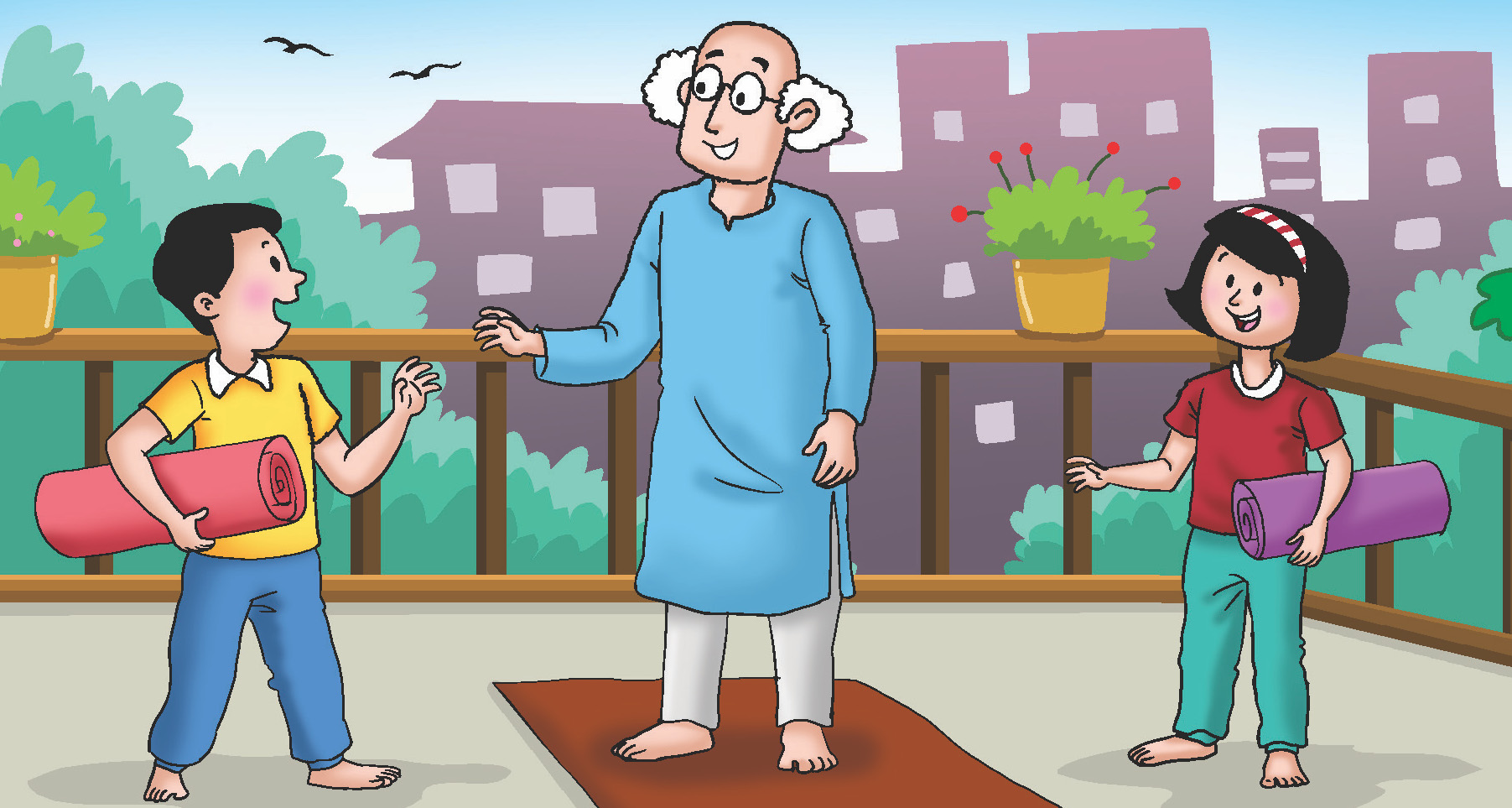
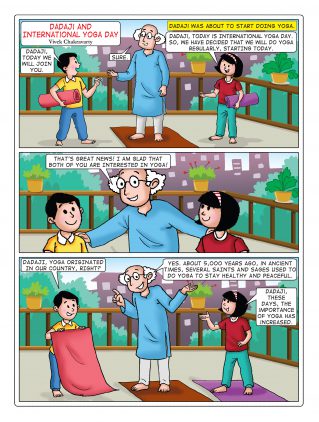
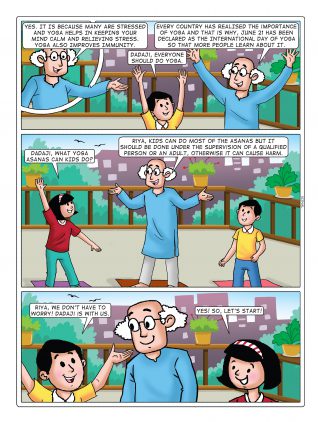

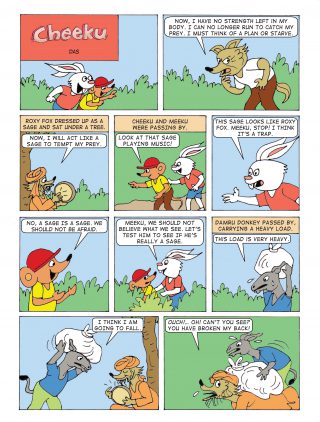
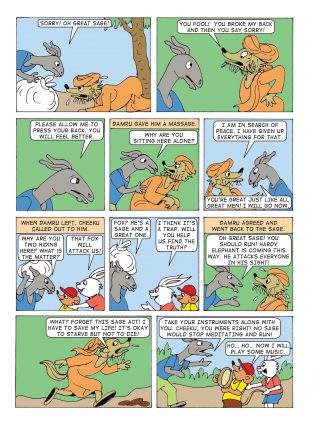
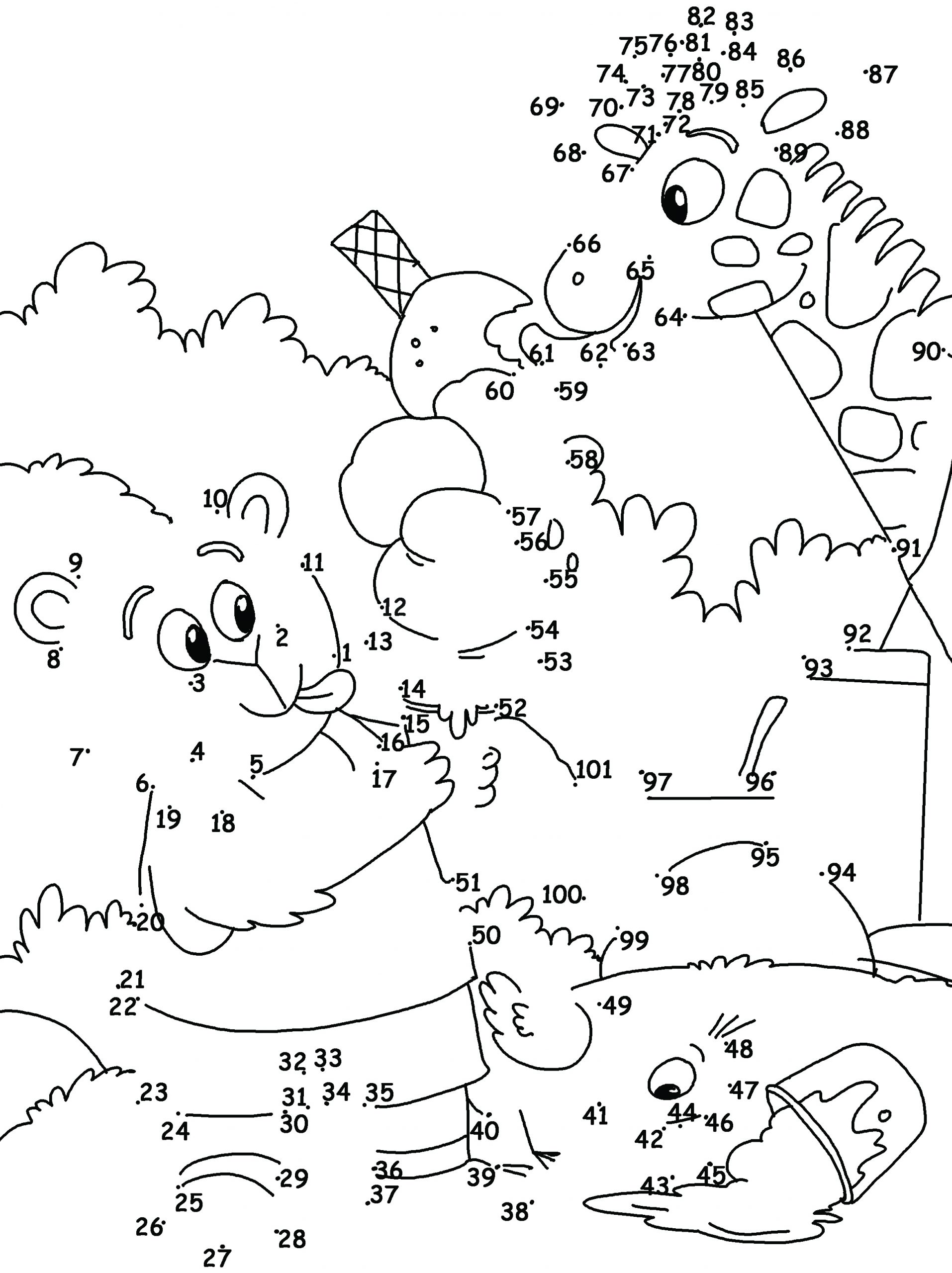
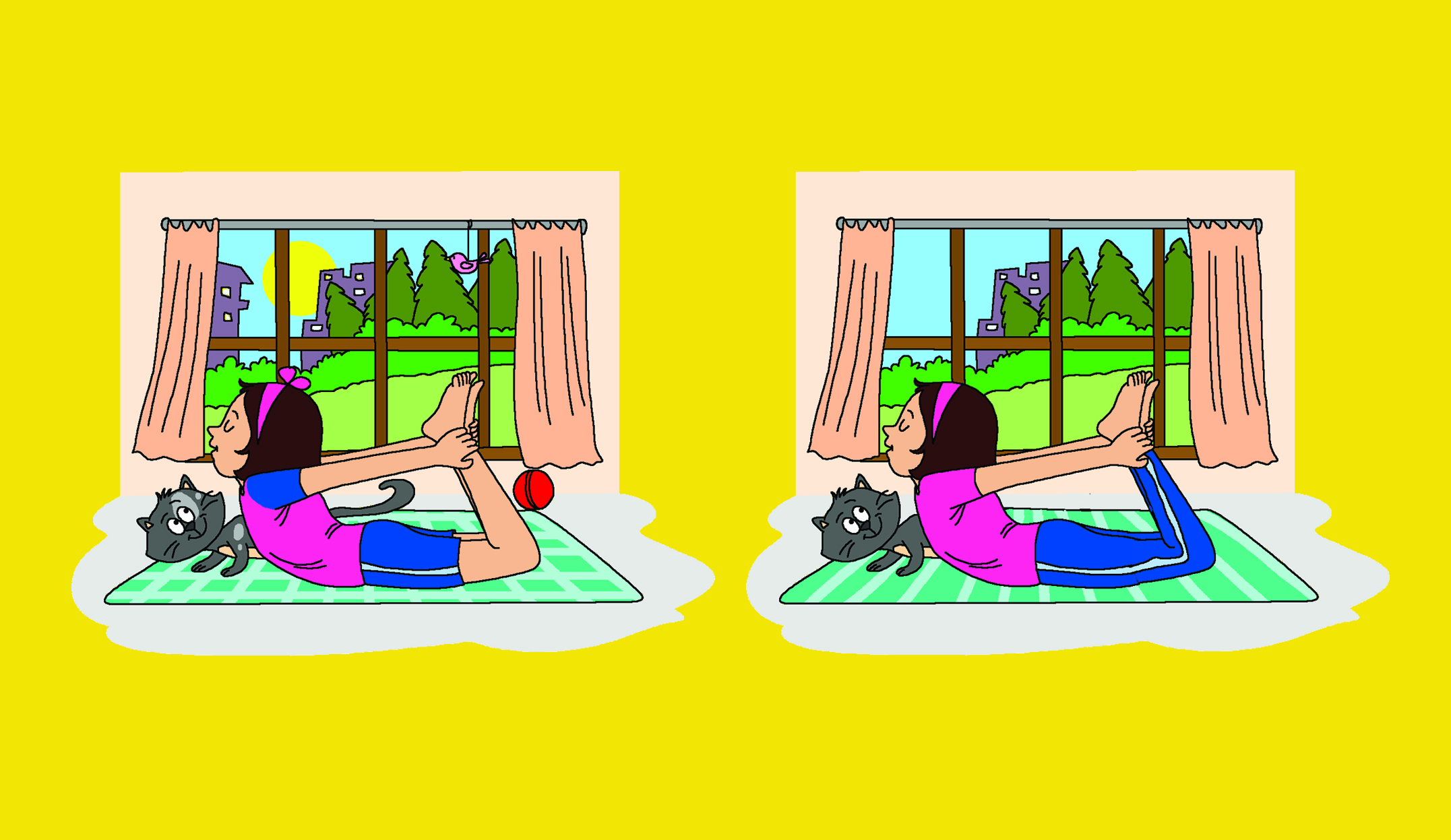
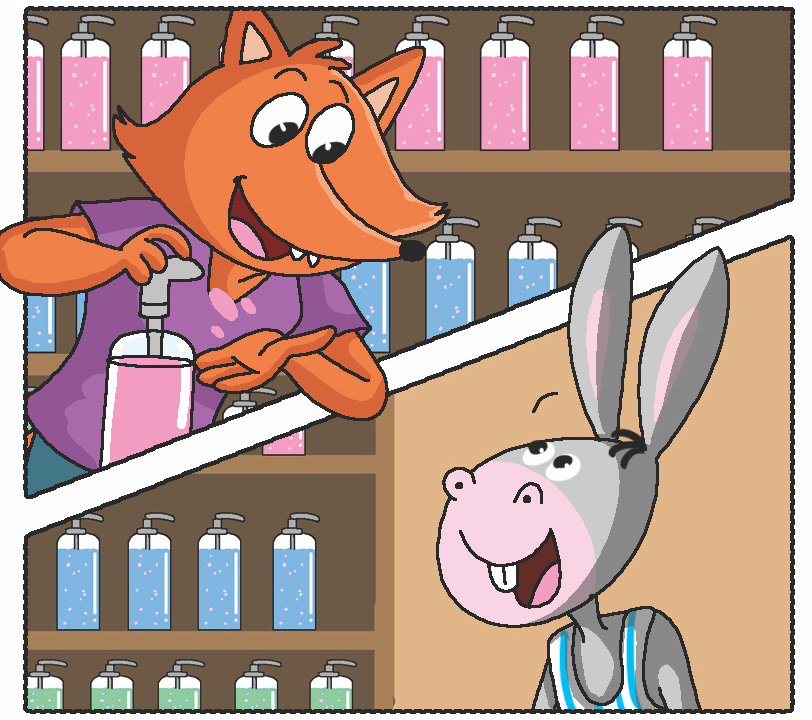
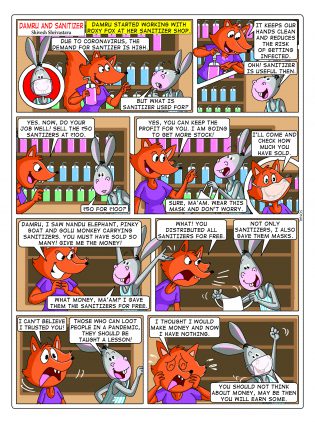
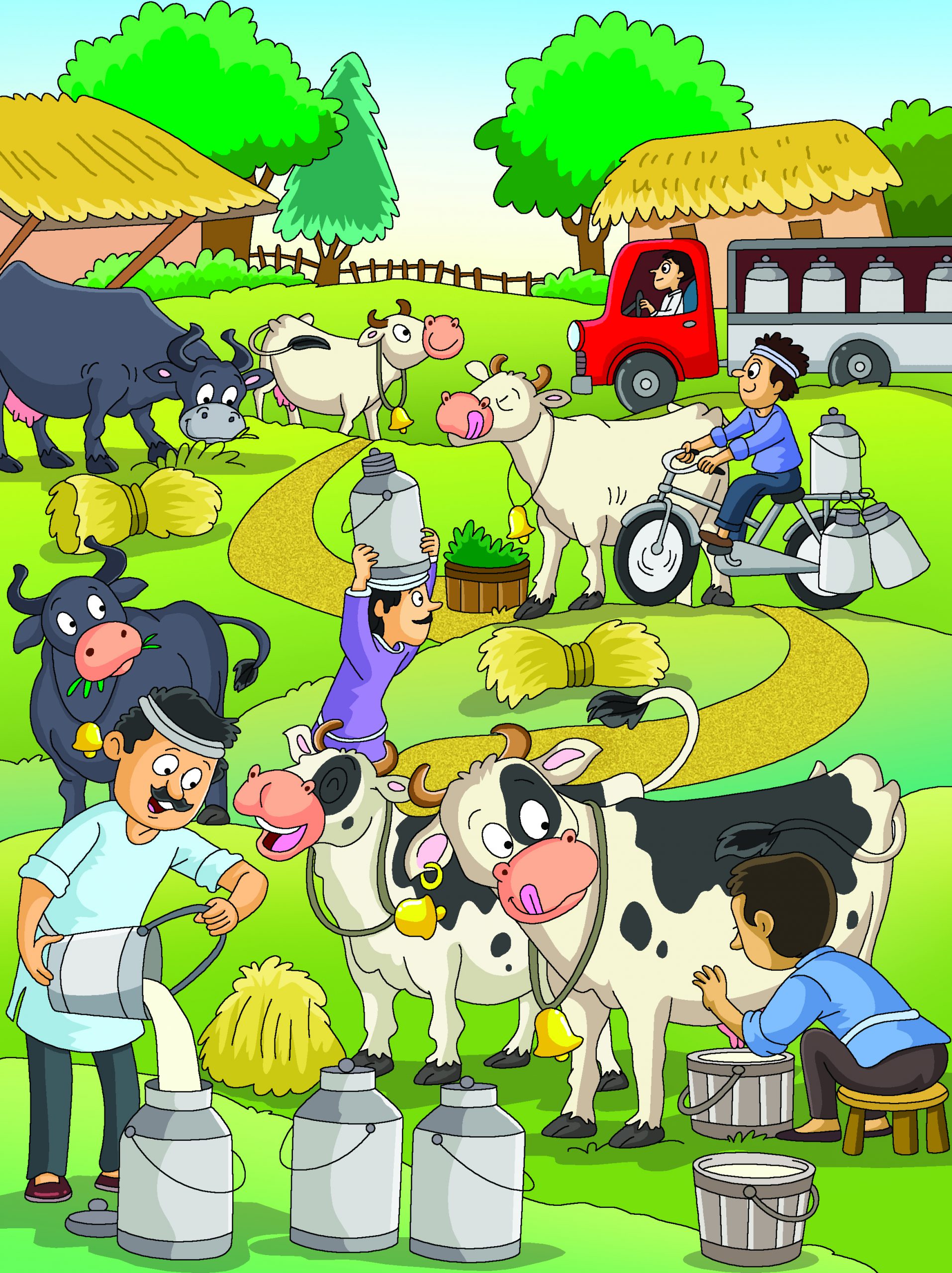
World Milk Day is observed on June 1. Look at the picture and answer the questions.
Q1. How many animals can you count?
Q2. At the milk farm, what is collected and distributed?
Q3. How many pails is the man on the cycle carrying?
Q4. How many pails can you count in total?
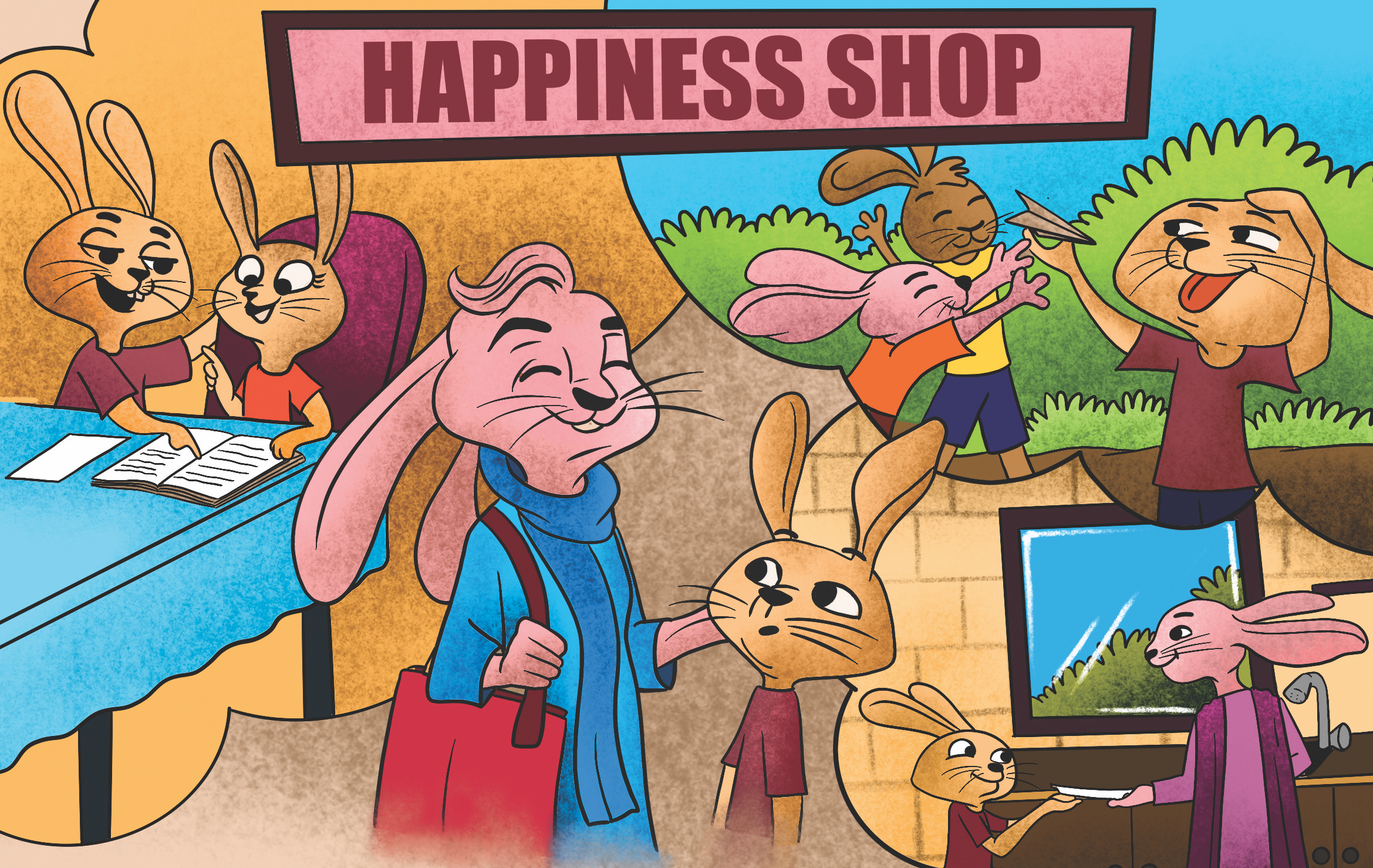
Vicky rabbit was fond of eating chocolates. He fought with his younger brother and sister because they unknowingly ate his chocolate that was kept in the fridge.
He was angry and sat quietly in one corner. Suddenly, the doorbell rang as aunt Ruby came to visit them.
Seeing Vicky sit quietly, she asked, “What’s the matter? Have you all fought again?”
Vicky’s looked up at aunt Ruby, trying to smile. He was happy to see her as she had a chocolate shop. He was sure that she must have brought lots of chocolate for them.
Vicky narrated the incident that happened in the morning with his siblings. He didn’t like being angry but could not help it.
Aunt Ruby heard him out and then asked, “If I own a chocolate shop, do I have to go somewhere else to buy chocolates?”
Vicky bowed his head and said, “No, aunt Ruby.”
“This also means that we will always have enough of chocolates in our shop, right?” aunt Ruby asked.
“Yes, aunt Ruby,” replied Vicky.
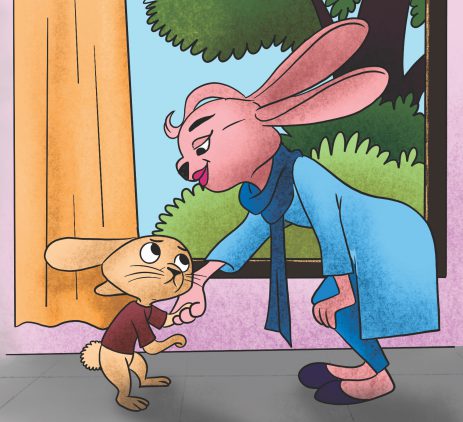
“Okay, so if you want to be happy, you need to open a happiness shop, so that you will always have enough, especially after you give it to others,” said aunt Ruby.
Vicky was surprised and said, “I never thought of it that way! But how can I open a happiness shop?”
“It’s very easy! Ever since you wake up in the morning, you have to help others and make them happy,” said aunt Ruby.
Confused, Vicky asked, “But how can I give happiness to everyone? Will they take it from me? Am I not too young to give happiness away?”
Aunt Ruby replied, “So what if you are young. There are many ways to give happiness. You can help your brother and sister in their studies, play with them, or share your things with them. Help your mother with the housework. You can help anyone if you wish to do so.”
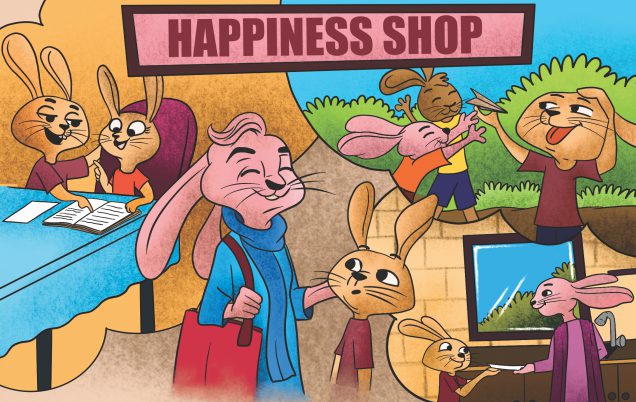
Vicky said, “I understood. Starting today, I will open my happiness shop.”
Next day, when Vicky was returning from school, he saw an old bear trying to cross the road and helped her.
He also carried her bag and dropped her home. The bear was happy and thanked Vicky.
When he reached home, his siblings were struggling to complete their homework. He helped them and shared his chocolates with them.
His siblings were happy to get an extra share of chocolate and that too from Vicky who loved chocolate so much.
In the evening, he helped his mother clean the house who was happy to see Vicky voluntarily helping her.
Vicky was satisfied with all he had done during the day.
Next morning, he heard his father tell his mother that some senior citizens are living alone in a house nearby. They were struggling to get things from the market.
Vicky took permission from his parents and helped the senior citizens to buy what they needed on his way back home from school.
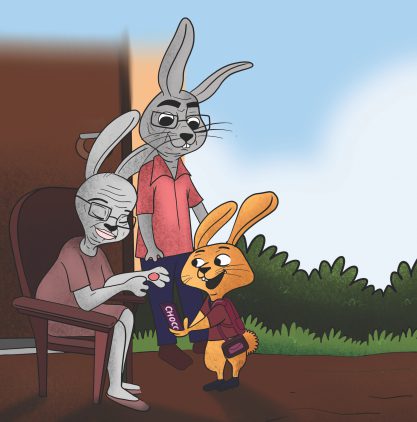
When Vicky had to buy many things, he and his father would go together as he couldn’t carry heavy items alone.
Vicky was delighted to help people and he realised that he was getting happier by the day.
A few days later, aunt Ruby visited Vicky again.
She looked at Vicky and said, “Looks like your happiness shop is running well.”
With a smile on his face, Vicky replied, “Yes, I am very happy about it! I will continue to share happiness with others as much as possible and run this shop of happiness forever.”
Aunt Ruby smiled and gave Vicky extra chocolates for his good work.
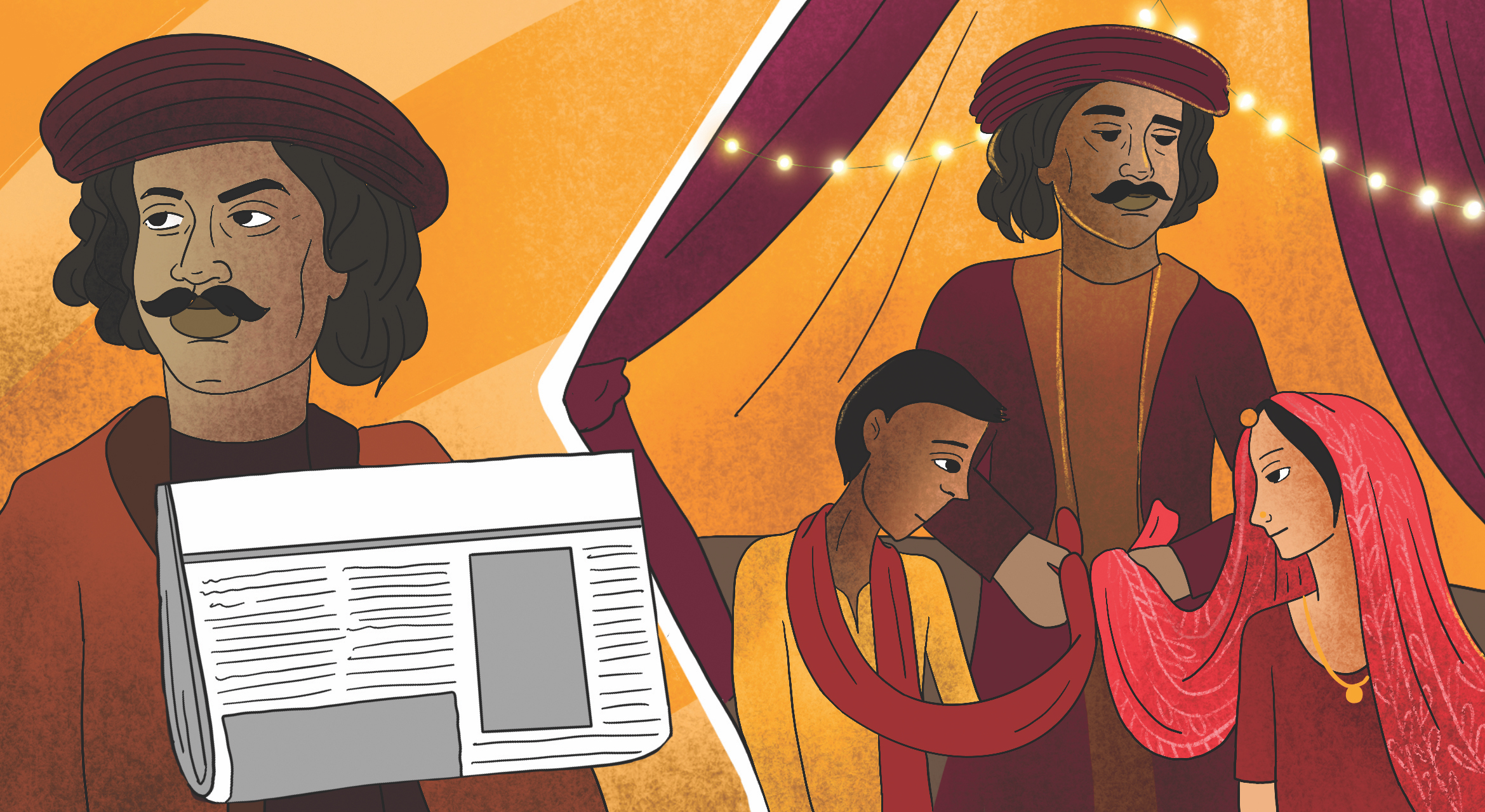
We live in a modern, progressive and independent India. But who was the first Indian who laid the foundation to this modern nation where people are allowed to talk freely? Undoubtedly, it was Raja Ram Mohan Roy.
Ram Mohan was born on May 22, 1772, in the Hooghly district of Bengal. His father, Ramakant Roy, was a wealthy landlord and his mother, Tarini Devi, was a religious woman.
When Ram Mohan was born, the condition of the country was miserable. People in India practised several evil acts like the purdah system where women had to cover themselves from head to toe or be hidden behind high walls and curtains outdoors and even inside their homes; Sati—a practice where widows had to jump in the funeral pyre of their dead husbands; child marriage, an act where children below the age of 18 were married; and female infanticide where newborn female babies were killed. These social evils were practised throughout the country.
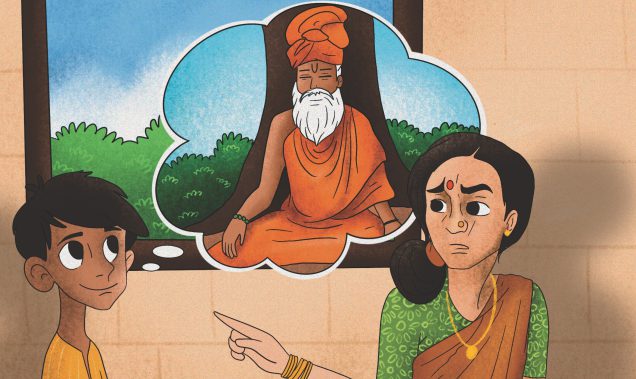
Many people in the country were not educated and believed in superstitions, which made the society unsafe, especially for women who had to do what they were told. There was no hope of improvement.
But just when all hope was lost, Ram Mohan came forward and took the responsibility to reform the society. But his path was not easy. He faced constant resistance everywhere, be it at home or outside.
He, too, was a victim of child marriage. He was first married when he was 9 years old. His first wife passed away at a very young age and soon his second marriage was held at the age of 10. He had two sons—Radhaprasad and Ramaprasad. His third marriage was with Uma Devi in the late 1820s.
At the age of just 14, he wanted to become a monk. But his mother opposed his decision and he let go of his ambition.
Soon, he travelled to Patna to study Arabic and Persian languages.
In Kashi (now known as Varanasi), he learned Sanskrit from the pundits and also studied the Vedas and the Upanishads— ancient Sanskrit literature that taught him to believe in the truth and accept nothing but the truth. The Vedas taught him that idol worship is unnecessary as God doesn’t have a body and is pure and cannot be created by man.
These lessons had a great impact on Ram Mohan and he began to question idol worship and several religious rituals.
This led to a life-changing incident in his life. His father was a devoted idol worshipper while Ram Mohan wasn’t. One day, a debate broke out between him and his father about idol worship.
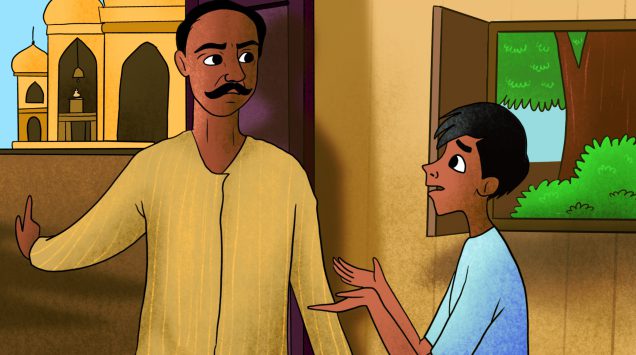
Ram Mohan said, “Father, why do you worship idols? You should only believe in god. The idols are created by man and worshipping them is meaningless!”
His father was deeply offended and said, “Where did you learn such nonsense? Idol worship is a means to reach God.”
“Father, why not worship him directly? What’s the need for a medium for that?” asked Ram Mohan.
The argument enraged his father and Ram Mohan left his house.
In 1803, when his father passed away, he began opposing idol worship and rituals openly.
He supported monotheism as described in the Vedas. Monotheism means all gods are one and only have different names.
He deeply believed in it and wrote a book in Persian called Tuhfat-ul-Muwahidin or The Gift of Monotheism.
In 1805, he met John Digby, a British officer who taught him English. This helped him understand the lifestyle and practices of people in English-speaking countries.
From 1809 to 1814, Ram Mohan lived in Rangpur city (now in Bangladesh). While earning for his family, he met people of all religions. He understood that to fight social evils, he would not get any support from society. So, he kept increasing his knowledge and experiences.
In 1814, Ram Mohan moved to Kolkata. In 1815, he founded the Atmiya Sabha—an organisation that invited people to share their ideas.
In 1817, he founded the Hindu College in Kolkata to promote modern education and English language. He wanted the number of literate people to increase as only then would they question the society and its evil practices. He believed that educated people will think rationally.
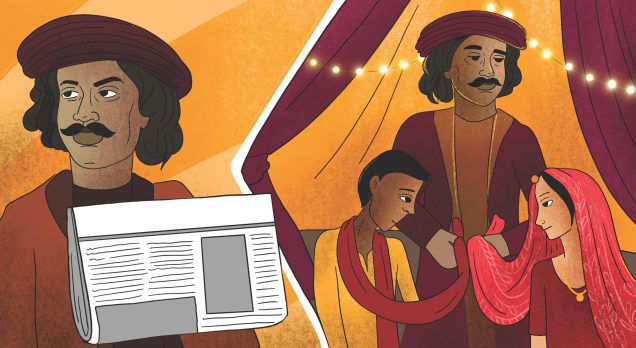
Ram Mohan’s work against the practices of the society was not welcomed by many and he had to face several challenges but he never lost courage and kept fighting and spreading awareness.
To reach the masses with his teachings, in 1821, he launched a Bengali newspaper Samvad Kaumudi and a Persian newspaper Mirat-ul-Akhbar in 1822.
In these newspapers, he wrote about the evils prevailing in the society like Sati, child marriage, purdah system and many others. His writings encouraged people to think about reforming the society.
People were forced to think:
“Why do we get children married when they are supposed to play at that age?”
“Why do we burn women alive on the funeral pyre?”
“What is the need for keeping women behind the purdah and separating them in society?”
“Why can’t we let widows have a new life of dignity by getting them remarried?”
The exact answers to such questions could be found in the writings of Ram Mohan. This marked the beginning of a reformed society.
In 1828, he founded the Brahmo Samaj and continued to fight for various social reforms through this organisation.
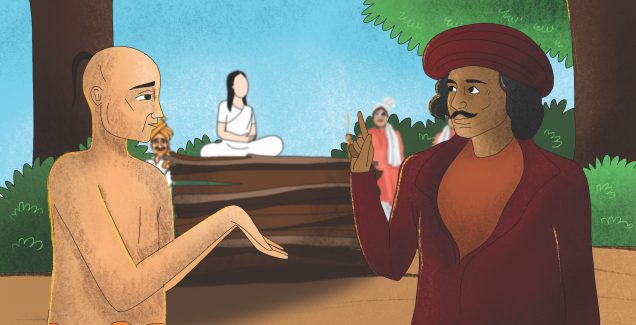
He achieved success in some parts of the country.
But Ram Mohan’s biggest success was the abolition of Sati. The practice of burning the wife alive on the husband’s funeral pyre was carried out for hundreds of years. It was a terrible practice where the woman was forcibly burned.
Ram Mohan took the battle of Sati from India to England. Due to his efforts, the British government banned Sati on December 4, 1829.
In 1831, the Mughal Emperor Akbar II gave the title of ‘Raja’ to Ram Mohan Roy.
He died on September 27, 1833, in Bristol, England. In his honour, the British government named a pedestrian path in Bristol as ‘Raja Ram Mohan Walk’.
Rabindranath Tagore, a famous poet, described him as the Father and Maker of Modern India.
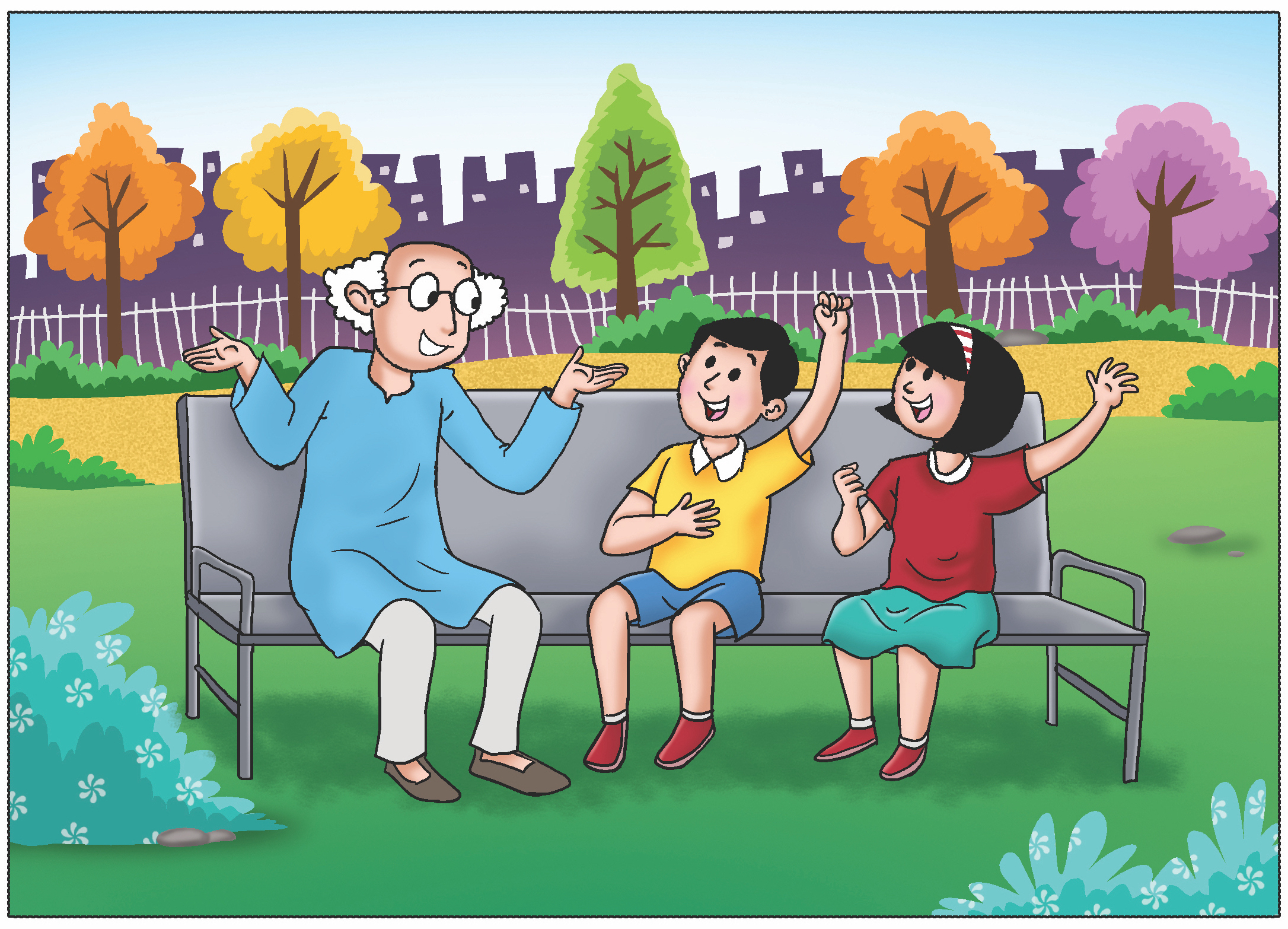
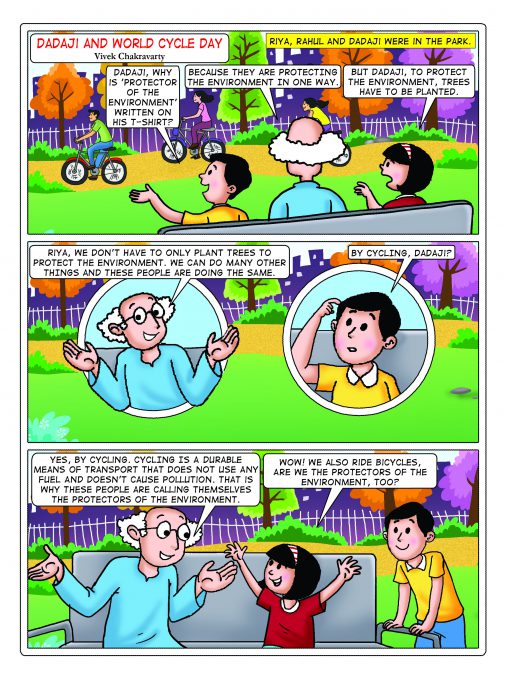
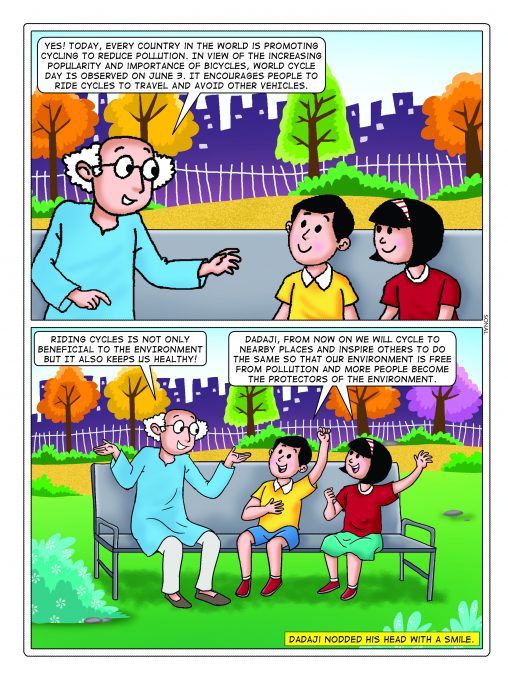
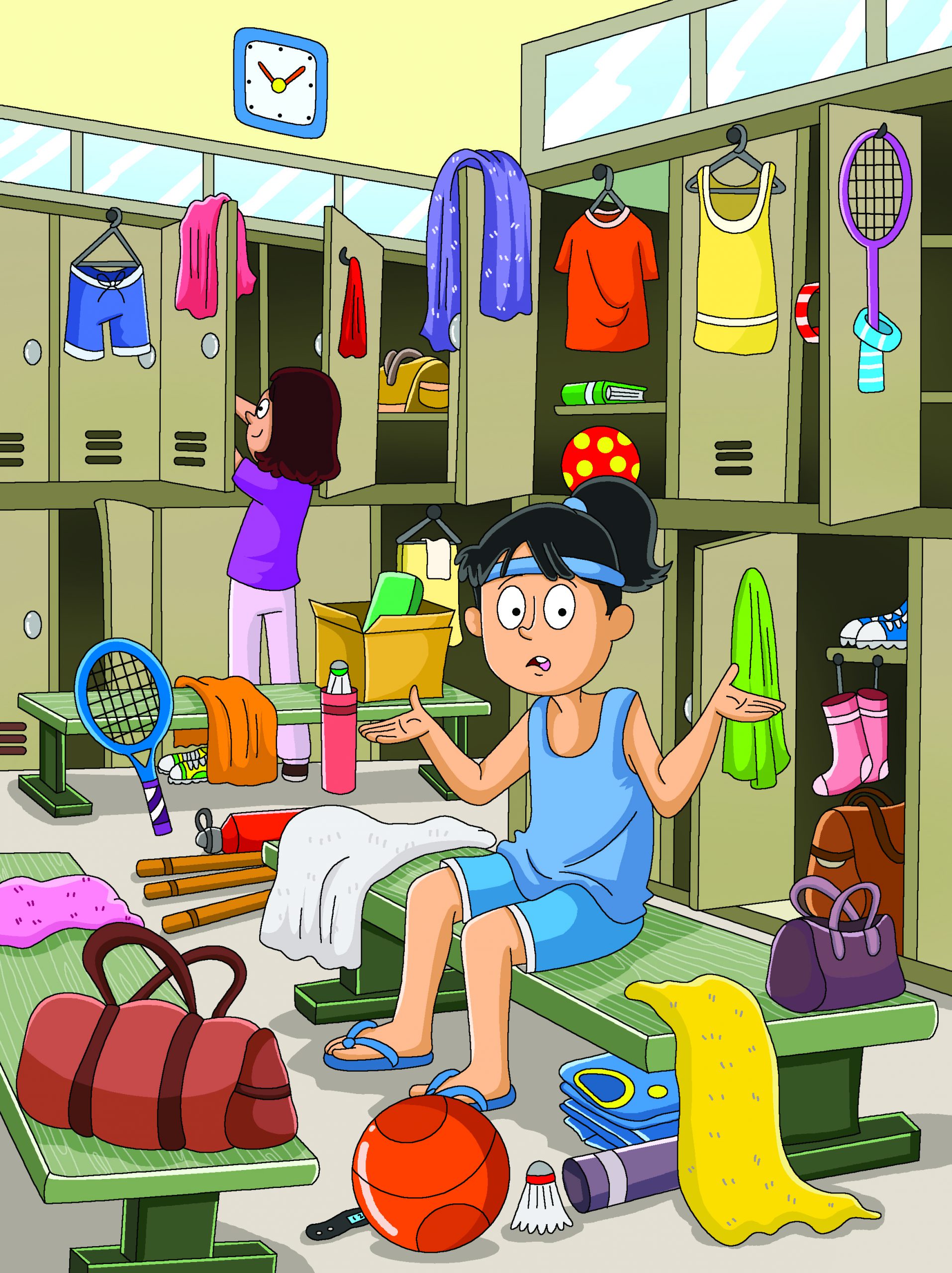
Reema, an athlete, has lost two pairs of sports shoes, track suit, a pair of sweat bands, fitness watch and water bottle. Help her find them!
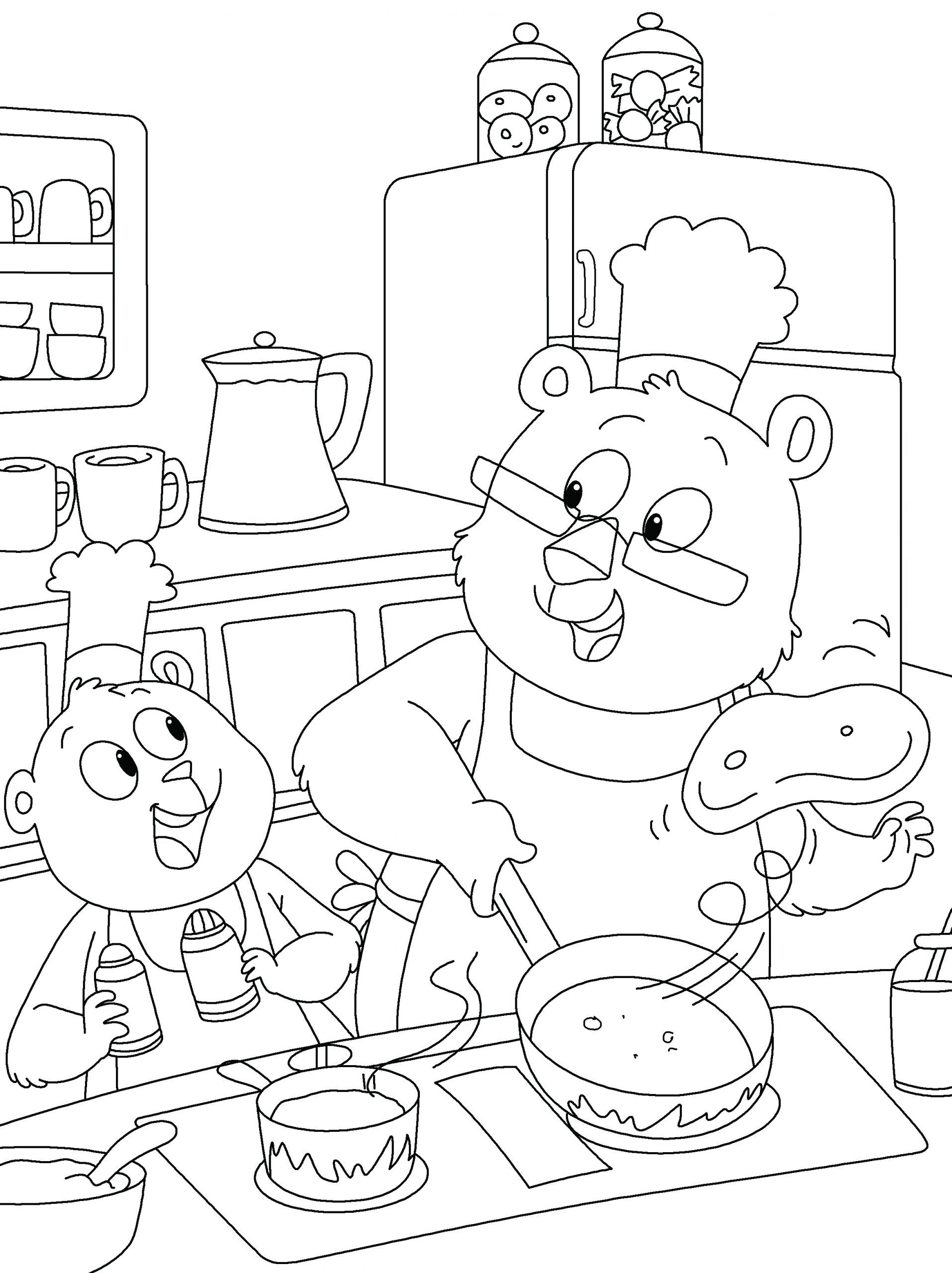

“How hot it is! When will it rain, mom?” asked Bolt, Misha cheetah’s cub.
Anandvan forest had no rains. Animals did not have enough food. The forest had always been short of water and now, whatever little water was there, quickly dried up under the hot sun.
The days were hot and dry, and the nights were eerily uncomfortable. Birds and animals with fur like bears were suffering the most.
Misha lived in the forest with her cubs.
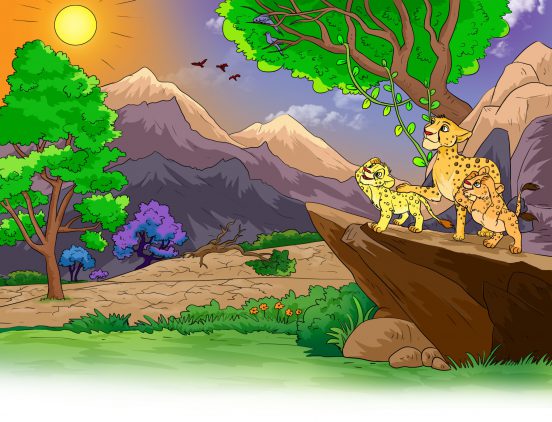
Clouds would form in the sky every day but would break without rain. The months of monsoon passed, but not a drop of rain fell from the sky.
Drought was declared in the forest. The Forest Administration advised all animals to move to other forests.
When the animals started migrating with their kids, the hawks arrived from other forests and said that animals from other forests were moving towards their forest. There was a drought everywhere and no one knew where to go.
The animals called for a meeting. It was decided that no animal would eat another during the meeting.
Deer, squirrels, buffaloes, zebras, cheetahs, tigers, bears, foxes, and rabbits—all came together.
King Sheru said, “Friends, we are facing drought because of the human race.
Because they believe they are superior, they have cut down trees and destroyed forests, constructed dams over rivers, drying them, and leading the planet towards destruction. The weather has altered. It doesn’t rain during monsoons, it isn’t cold during winters, and summers are increasingly hot. Our food chain is being destroyed because of no food and bad water.”
“So we too must destroy the humans.
Down with humans!” shouted Foxy fox.
The others repeated after him, “Down with humans! Down with humans!”
The whole forest started chanting in hatred of humans.
“Quiet!” said King Sheru in his firm voice and everyone fell silent. “Tonight, we shall attack the human city closest to the forest and take their food and water. They too should know what it feels like when they starve.”
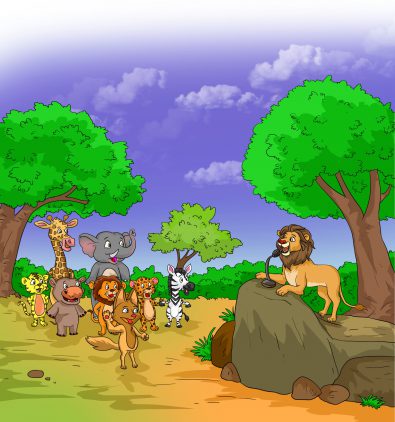
The animals clapped at their king’s decision and waited for nightfall. As soon as the sunset, tigers, bears, jackals, and cheetahs crossed the forest borders to hunt the human territory.
But the humans had good security systems in place, so the animals could not do much and just about escaped the traps set for themselves and returned.
The news about their failure spread through the forest.
King Sheru called for another meeting.
Some hyena who had been beaten up by the humans were standing in one corner and shivering with fear.
“Residents of the forest! We can’t live in fear! We must keep fighting! In this struggle for survival, we must…”
But before King Sheru could finish, Misha interrupted him and said, “Your majesty, with your permission, may I say something?”
Misha was loved and respected by everyone because she was a wise animal who found solutions without blaming or fighting.
The king nodded, and Misha said, “Friends! Our fight is not with humans but with what they have done. They have misused their knowledge and have caused destruction to nature. The earth is heating up. The glaciers are melting but not just us, the humans too are suffering because of it. In some years, they too will face scarcity of food and water.”
Everyone listened to her attentively.
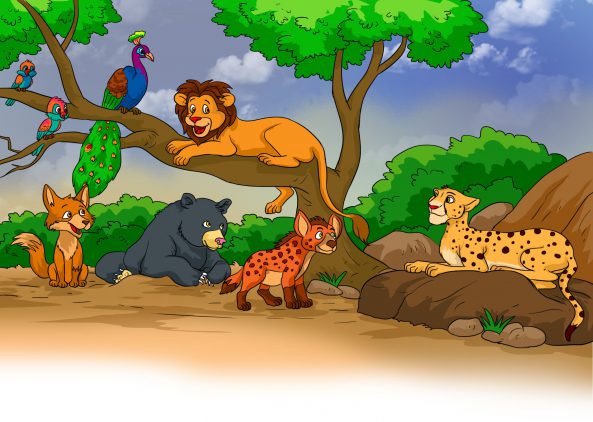
“If we attack humans,” continued Misha, “we will not survive. They are stronger than us.”
Some animals, like the hyenas, who had been beaten agreed with her, but the others still wanted revenge.
“Do you have a solution to the problem, Misha?” asked the king.
“I do, your highness, but it’s going to be time-consuming and slow,” said Misha.
“Do tell us!” said the animals.
“We should try and grow our own food instead of stealing food and water from humans. Everyone will have to work hard and have the patience to see the results.
If it does not work, we will try another way,” she said and explained what had to be done.
Next morning, the work started. Barren lands were dug by oxen and birds got the seeds sown. Elephants and bears got water from far away lakes that still had water.
All the animals and birds contributed to the cause based on their skills and all helped each other.
Working hard, they believed Misha’s plan would bear fruits. They knew about farming as they had seen humans do it.
Days passed into weeks. But neither did the weather improve, nor was there any sign of food.
All their hard work seemed to have failed.
They started thinking they would rather have stolen food. They decided to go and attack humans and called for a meeting with their king.
They had only just reached his cave when lightning struck. The entire forest lit up in a flash and it started raining. Where seeds were sown, saplings appeared and the lakes started filling up.
With the crops growing, food problems also slowly began going away. Since the herbivores could now eat, the carnivores were hopeful about having food too.
Misha’s plan had worked, though it took time.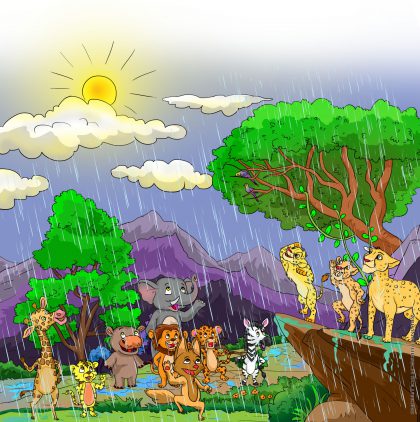
If they had attacked humans, there was no guarantee of a continuous supply of food and water.
They had learnt that if you wish to do something, the best way was to “do it yourself.”
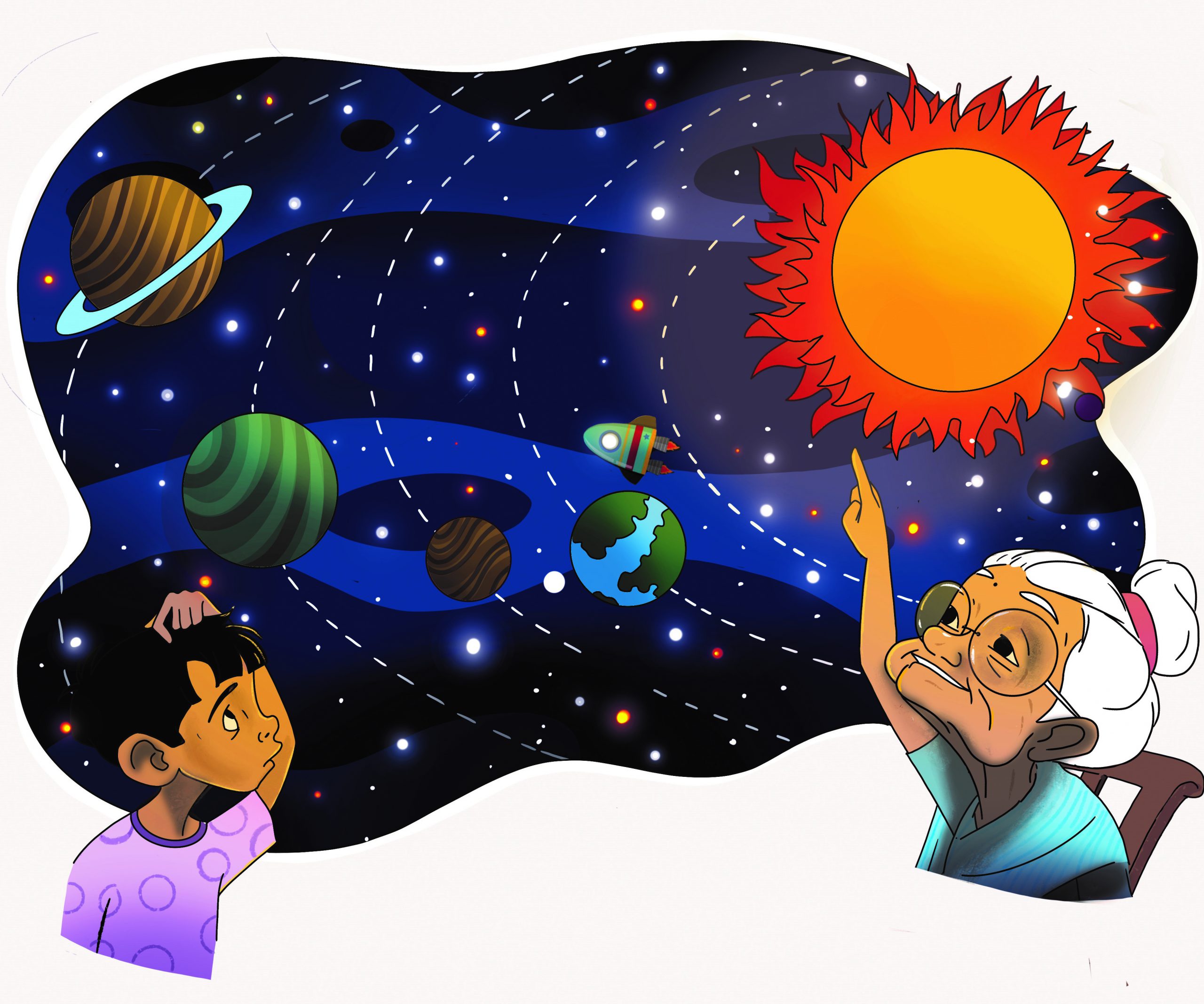
Rahul saw Vikram Lander reach close to the Moon on television.
Vikram Lander had been sent to look for water on the Moon. After hearing this news, Rahul went straight to his dadi and said, “Dadi! The story you had told me about the Moon is not true.”
Dadi did not understand what Rahul was saying. “Rahul, what story are you talking about?” she asked.
“Dadi, you had told me that the Sun and the Moon were brother and sister.”
“Yes,” said dadi. “And why do you say it’s not true?”
“But, dadi, how can they be brother and sister?” asked Rahul.
“They live far away from one another.”
“You mean to say that by staying far away, there is no relationship between brother and sister?” asked dadi.
“My brother lives 900 kilometres away from here in Mysore. It has been a long time since I met him. So, is he not still my brother?”
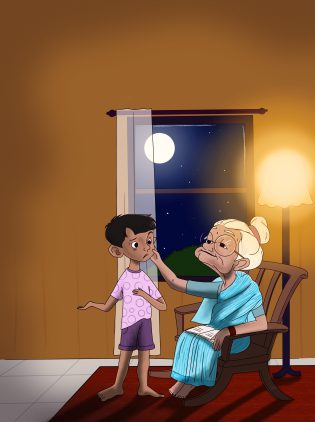
Rahul did not have a reply to this question. He was confused if he should accept the Sun and the Moon as brother and sister. He looked towards dadi questioningly.
To clarify, dadi prompted him, “Rahul, tell me, who are called siblings?”
Hearing this Rahul laughed. “Oh, dadi, that is very simple,” he came and sat near her. “Boys and girls who are born of the same parents are called brothers and sisters.”
“Do you know, the Sun and the Moon are born from the same universe? That’s why they became brother and sister. We consider the Earth to be the mother, so what is the harm in considering her children as brother and sister.”
“But why?” asked Rahul.
“The children serve their parents who look after their children during their childhood, is it correct or incorrect?” asked dadi.
“Yes, correct,” replied Rahul.
“Then tell me, what will happen if the Sun stops rising?”
“There will be no day.”
“Is that all?”
“Yes, that is all I know,” said Rahul.
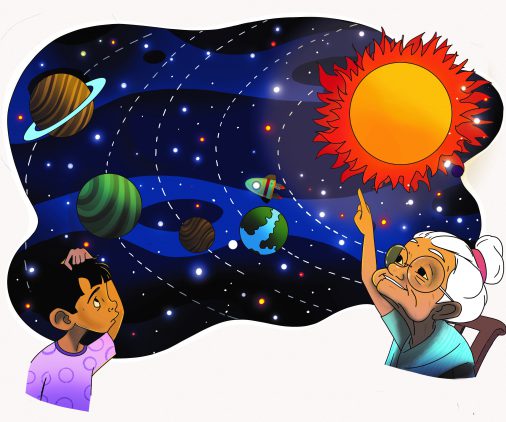
“Oh no!” said dadi, “It is not so. If the Sun stops rising, then the plants and trees cannot grow. There will be no fruits and flowers. It is so because the plants prepare their food from the Sun’s rays. In the presence of the Sun, they release oxygen into the atmosphere. If the Sun’s rays are not received, then there will be no plants and trees.”
“And if there are no plants and trees, what will we eat then?
This is what you want to say, isn’t it, dadi?” Rahul interrupted her.
“Yes, that’s right!”
“But, dadi, tell me, you are saying that the Sun and the Moon are brother and sister, and they play hide and seek every day? How is this correct?” asked Rahul.
“You must have seen the Moon rising at night. Some days, it rises early and some days late. Some days, it is small and some days it is whole. All these are its art, which we call Moon-art,” said dadi and Rahul nodded his head.
“The Moon revolves around the Earth, right?”
“Yes, dadi,” said Rahul, “And the Earth revolves around the Sun.”
“Yes. And because of this revolution, the rays of the Sun sometimes fall fully on the Moon and sometimes only partially. The Moon revolves around the Earth and the Earth around the Sun. Because of this, sometimes the Moon comes completely in front of the Sun and sometimes partly, and the other part is in darkness.”
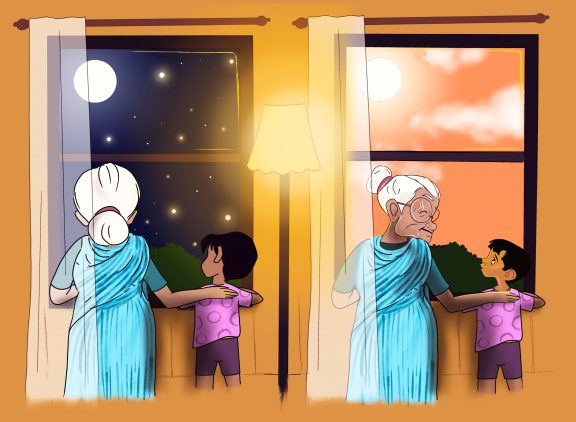
“Yes, dadi. I understand this,” said Rahul. “But if they are brother and sister, shouldn’t they live, eat and drink together.”
“As you know that the Earth is a planet; and the Moon is a satellite. Planets revolve around the Sun. This means they are lifeless. Then, how will they eat or drink?”
“But you had said that the Sun and the Moon had quarrelled and in anger, they went far away to live separately; and they did not come in front of one another. Then their mother made them make a compromise and they sometimes come to meet one another. But I do not understand how they can come from so far to meet one another.”
“You are right,” said dadi. “There is a lot of distance between the Earth and the Sun.”
Rahul interrupted her, “Not just a lot, dadi, but 15 crore kilometres.”
“Actually, the distance is 1,496 lakh kilometres.”
“No, dadi. You are wrong,” said Rahul.
“My dear, you are also right and I am also right. You are saying 15 crore kilometres; when I am saying four lakh kilometres less, which is the accurate distance.”
“What?” Rahul could not believe her words.
“Yes. This is correct, you can say 14 crores 96 lakh kilometres, which is 4 lakh kilometres less than 15 crore kilometres that you are saying.”
“Oh, dadi! You also know so much about the Sun and the Moon,” said Rahul hugging her. “I had thought that my dadi knows nothing.”
“After all, whose dadi am I?” she said. “I also read like you.”
“But dadi, are the Sun and the Moon actually brother and sister?” Rahul still asked.
Dadi replied, “Oh, dear! They are brother and sister in your dadi’s story. A story is the gift of one’s imagination. Because of stories, we learn to stretch our minds to imagine. And sometimes, our imagination may become a reality.
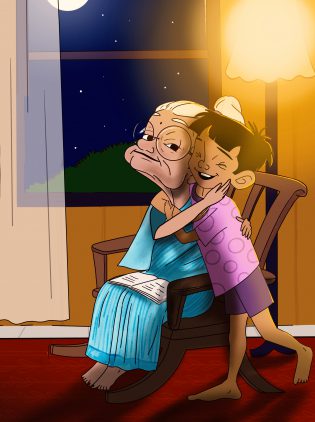
Hearing this, they both laughed.
“Actually dadi, the Moon of your story is really very lovely,” said Rahul and he put his head on her lap. Dadi stroked his head lovingly to put him to sleep.
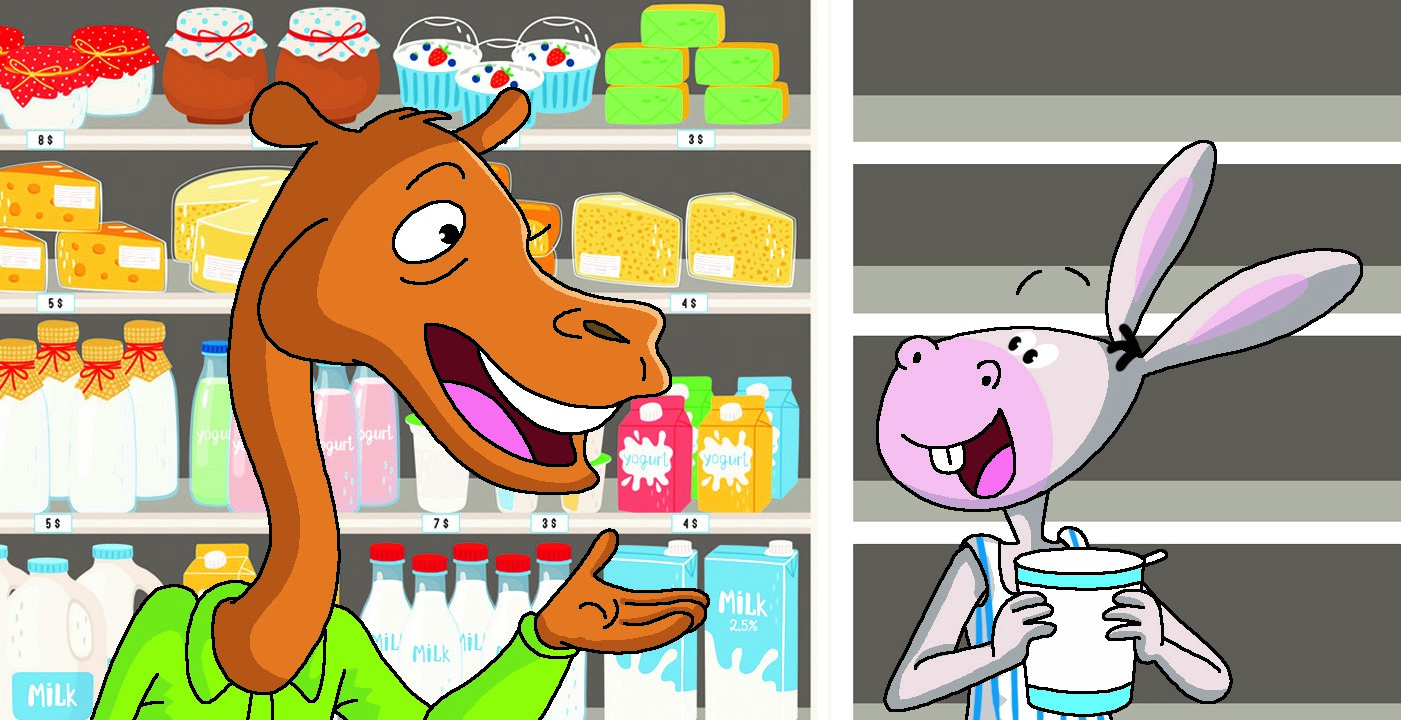
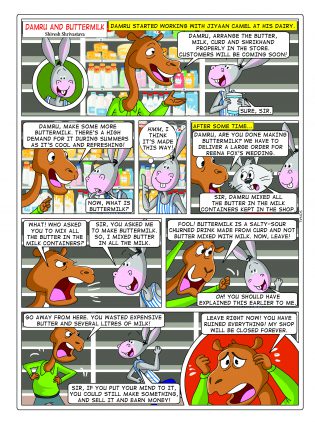
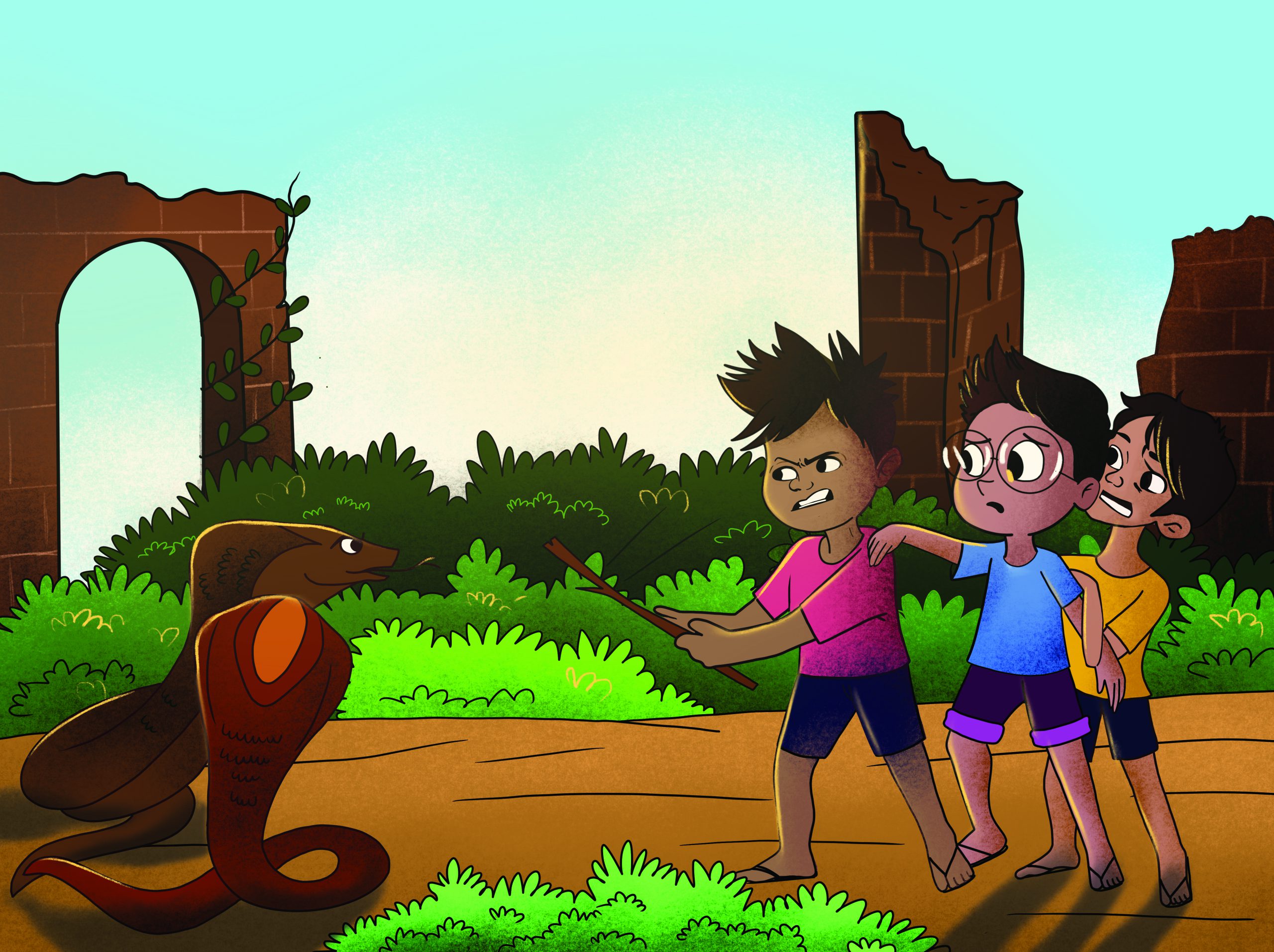
“Yash! Yash! I just learned something interesting!” said Karan, panting.
“Karan! Catch your breath first? Now, tell me, what it is?” said Yash, resting his bat on his shoulder.
“About three kilometres from here flows Ratna River. On its shore, there is an old house with a well.”
“What’s special about that?” asked Yash.
“Oh, Yash! Don’t you know? The British have hidden a truckload of treasure inside that well.”
“How do you know there’s treasure inside the well?”
“My grandpa told me that during the revolt of 1857, the British government had hidden its treasure in that well so that the revolutionaries would not lay their hands on it. The British were killed during the revolt, but the treasure is still inside the well. No one has found it till now.”
Yash thought for a while, and then said, “Karan! The treasure in the well can be ours! We’ll do what no one has done!”
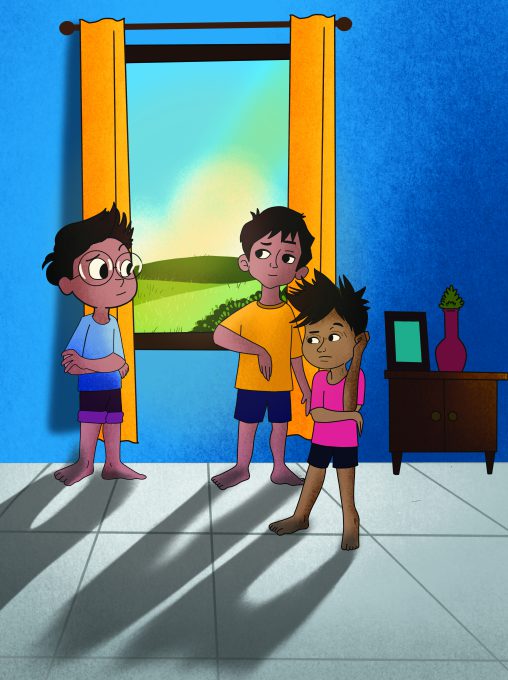
Yash and Karan talked and walked towards their closest friend, Mohan who had an analytical way of thinking.
Mohan loved reading detective stories and had learnt about being a detective through them.
He listened to his friends attentively, and then said seriously, “Hmm! A treasure in the well! We will find it, no matter how hard it is.”
The three of them started drawing up a plan and decided to go on Sunday to find the treasure. They also agreed to collect things that they would need to draw out the treasure.
They collected large bags to put the treasure once they got it, and sticks with pointed ends like spears to fight off any danger they may face. They took a large rope for getting inside the well, and a pickaxe for digging.
On Sunday morning, the three friends set off on their treasure hunt fully prepared.
Their first obstacle was the way to cross the Ratna river. Though the river did not seem to have a lot of water, they didn’t know its depth. They took off their clothes and shoes and put them in a plastic bag.
They used their sticks to measure the depth of the river and started walking across it slowly. They walked through the parts where the water was shallow and avoided the deeper pockets.
They had almost reached the shore when Yash screamed. “Ouch! Ouch!” and jumped and rushed towards the land. Mohan and Karan got scared and followed Yash quickly.
When they reached the land, they found Yash stamping on the ground. They saw that two leeches were attached to Yash’s legs and they had become swollen sucking his blood. Yash tried shaking them off, but could not. He was screaming now.
Hearing the screams, a farmer working in a field near the river came running. He saw Yash stamping and understood what had happened.
He immediately pulled out a small bottle that had white powder from his pocket and sprinkled some on the leeches and they came off Yash’s legs at once.
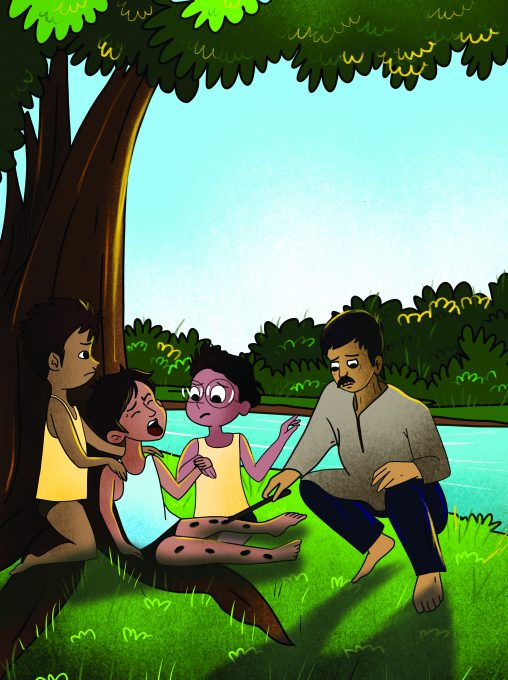
“There are a lot of leeches in this river,” explained the farmer. “We bring our cattle to bathe here and they stick to their legs too. The only way to get rid of leeches is to sprinkle salt on them. That’s why I carry a bottle of salt with me!”
Yash thanked the farmer, and the three friends began walking towards the old house. They had just crossed a field when they heard a buzzing noise. A swarm of bees were coming towards them!
Yash and Karan turned around to run but Mohan yelled, “Put the treasure bags over you!”
The three friends immediately put the empty bags over them. Through the bags, they could hear the bees buzzing and were scared they would get stung. But luckily, the bees flew away and the three friends removed their bags, looked at each other and laughed in relief.
“We didn’t expect our hunt to be full of dangers!” exclaimed Yash.
“Yes, shall we go on?” asked Karan.
“Yes, of course! We’ll find that hidden treasure!” answered Mohan, and the three of them marched ahead.
They soon reached the old house that looked like a ghost house. Trees and bushes had grown through its walls. The windows were broken and covered with cobwebs and looked dark and scary.
But even more scary was the snake in front of the house! Soon, a second snake joined it and the children recognised them as poisonous snakes.
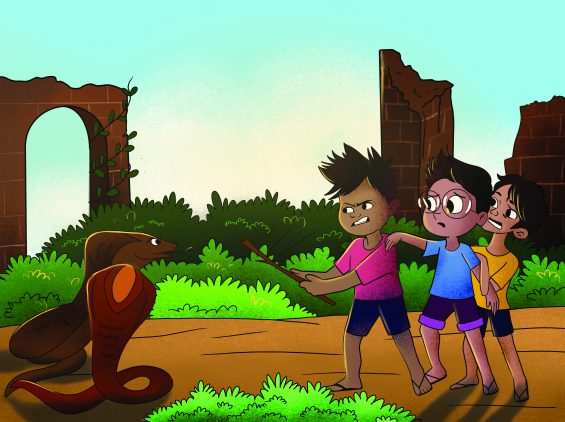
Karan was about to hit the snakes using his pointed stick, but Mohan caught his hand and said, “Don’t hurt them!” he whispered. “Stand still and they’ll go away.”
Sure enough, soon the snakes slithered away.
“You see Karan, snakes are shy. They don’t attack till they feel threatened.
If you had hurt them, they would have attacked us,” explained Mohan.
The three friends then tiptoed through the grounds and finally saw the well. But just before they could go near the well, they heard a rustling noise! Was that some wild animal that would attack them?
They took a step back and looked inside and saw two rabbits running away!
With a sigh of relief, the three went closer to the well and looked inside. It was deep. Plants and weeds had grown along its walls. They could not see the bottom. One of them would have to climb down to get the treasure!
“Mohan, you are the thinnest. You should climb down!” said Karan. Yash is heavy and we will not be able to pull him out.”
Yash laughed but was secretly happy that his weight had saved him from climbing down. He did not want to get stuck inside the well! Mohan tied one end of the rope to a tree trunk and tied the other end to his waist.
“Yash and Karan, release the rope slowly.
Once I reach the bottom, I’ll find the treasure and put it in the bags. Then I’ll shout so that you can pull me up.”
Mohan balanced himself along the side of the well and slowly started climbing down easily. When he reached the bottom, he looked all around for the treasure that was not there.
Instead of the gold coins, he was expecting, he saw a scared white baby rabbit that tried to hide when Mohan reached to pat it.
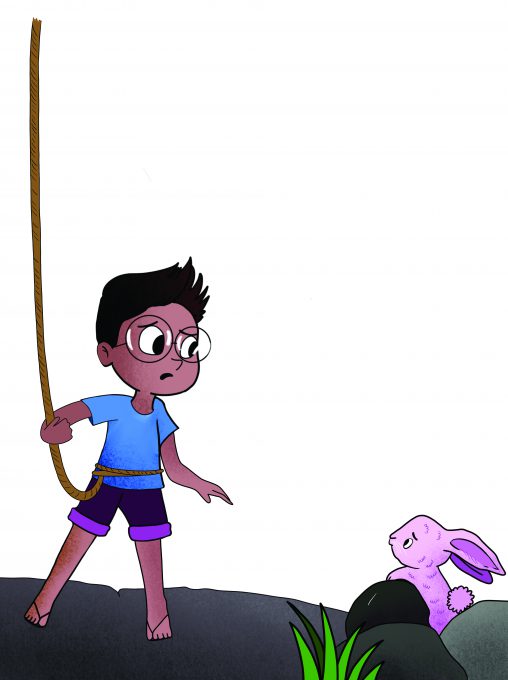
Mohan realised that the baby rabbit must have fallen into the well. The two rabbits that scurried when they had reached the well must have been her parents.
Thankfully, there was no water in the well, otherwise, the baby would have drowned.
Mohan carefully picked up the rabbit and put her in his bag. He used his pickaxe to make some holes in the bag for her to breathe. He took the bag on his back and tied the pickaxe to the rope. Then he called Yash and Karan to pull him. Yash and Karan were thrilled because they thought that Mohan had found the treasure. They started pulling the rope with all their might. Mohan, too, started carefully climbing upwards.
When he reached the top, Yash caught Mohan’s hand and pulled him out.
They were all exhausted and lay flat on the grass for some time.
Then Yash could not hold himself and picked up the bag Mohan had dropped on the ground and opened it. He wanted to see what was the treasure they had found!
But the treasure inside the bag was scared of Yash and started jumping. Yash dropped the bag in fear and Mohan took the rabbit out of the bag and told them that this was the only treasure he found inside the well.
Karan said, “Mohan, you are kind. I wish everyone was as kind as you are. So many animals can be saved by our small acts of kindness.”
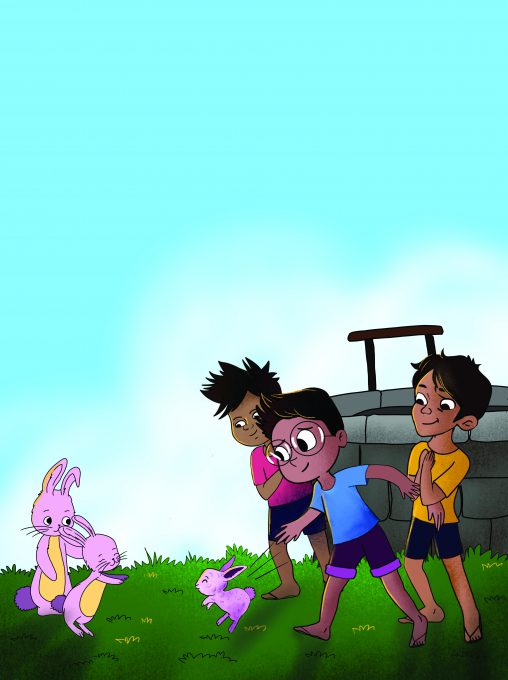
Just then, they saw the rabbits coming back looking for their young one. Mohan released the baby rabbit in the direction of her parents. The rabbits were overjoyed upon being reunited. The three friends were also overjoyed—the treasure they found was a unique one.
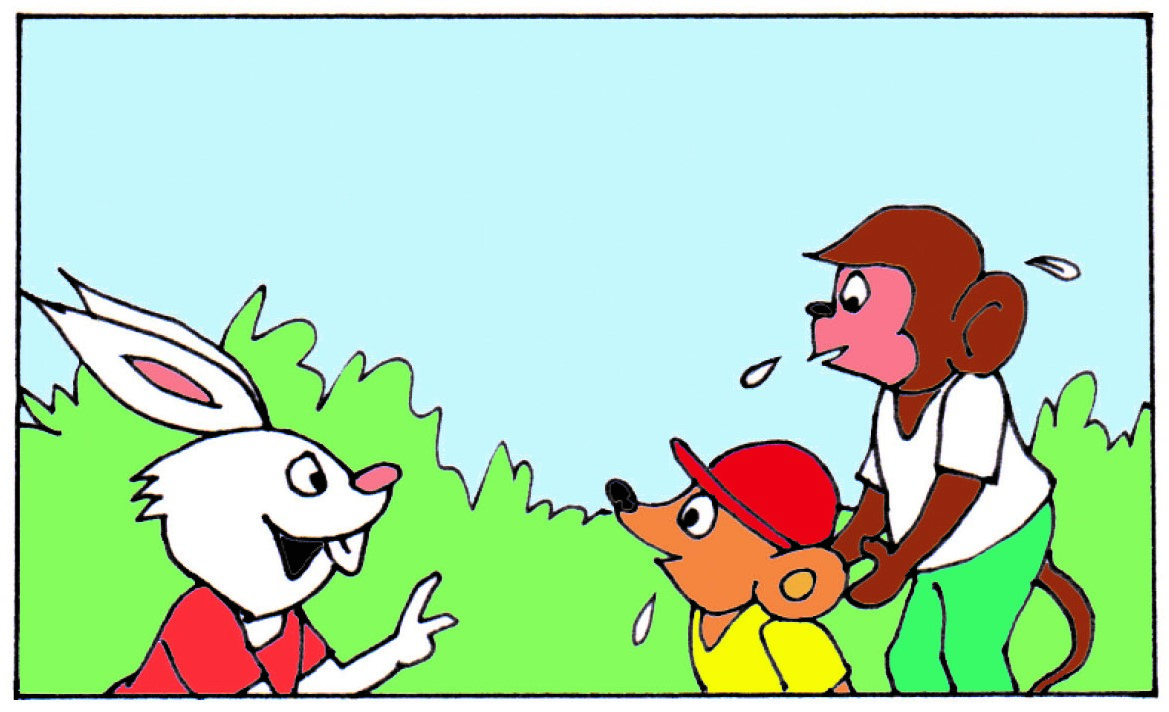
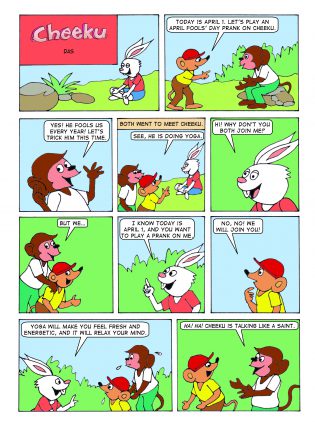
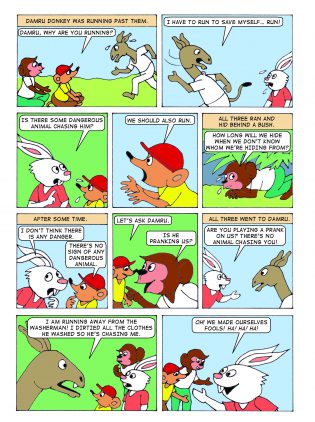
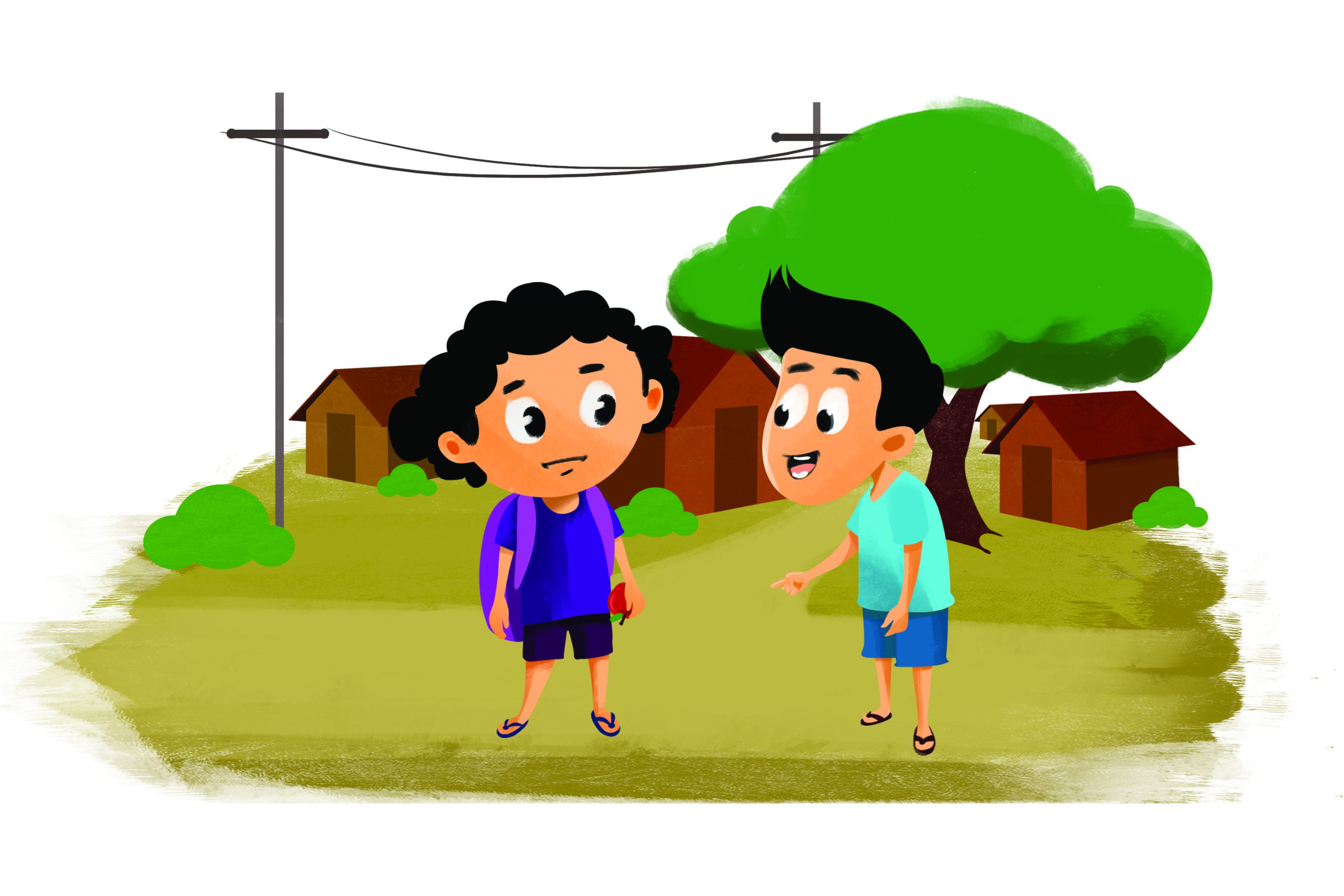
Kittu was walking down the road, holding an apple in one hand and a sack in the other. He met Venkat on the way.
“What’s with the apple and the sack?” asked Venkat, curiously. “That apple looks delicious! I love apples.”
Kittu shook his head. “Oh no, the apple is for someone else.”
“For whom?”
“If you must know, it’s for Mrs. Natrajan who lives at the end of the road.”
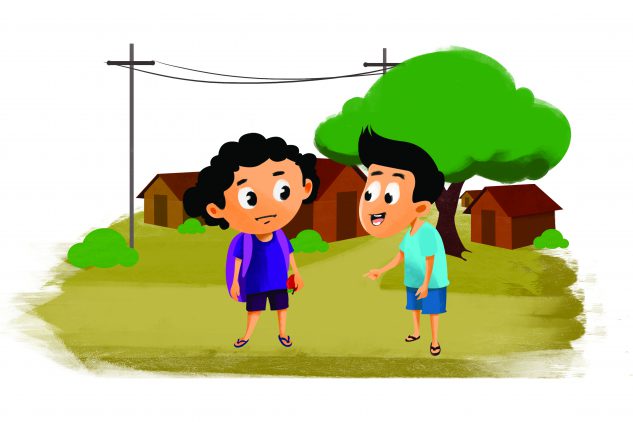
“That crabby old lady? She’ll bite your head off!” warned Venkat.
“Oh no, she won’t,” answered Kittu, confidently.
“You never give things without a reason.
Why are you giving her an apple? Asked Venkat, narrowing his eyes.
“What do you mean? I have no motive!” said Kittu, opening his eyes wider.
“Don’t pretend with me. I know you better!” Kittu sighed. Mrs. Natrajan has a mango tree in her garden. And those are the best mangoes I have tasted! She loves apples and I love mangoes. So I thought I will give her this apple and hopefully she will let me take some mangoes. That’s why I am carrying the sack!”
“I knew you would not do something without a reason. Anyway, you can’t carry such a heavy sack. I’ll come and help you!”
“And I am sure you want some of the mangoes for your help,” replied Kittu, as he knew Venkat would not help just like that.
Venkat grinned and said, “Well, if you are that kind, considerate and generous, who am I to refuse?” Kittu threw a nasty look at him but realised that he wouldn’t be able to carry the heavy sack by himself, so he agreed to take Venkat along.
Both set out to Mrs. Natrajan house.
As they neared the house, they found her standing outside, yelling at the top of her voice at some kids who were trying to steal mangoes from her tree. She was shaking her hands furiously at them.
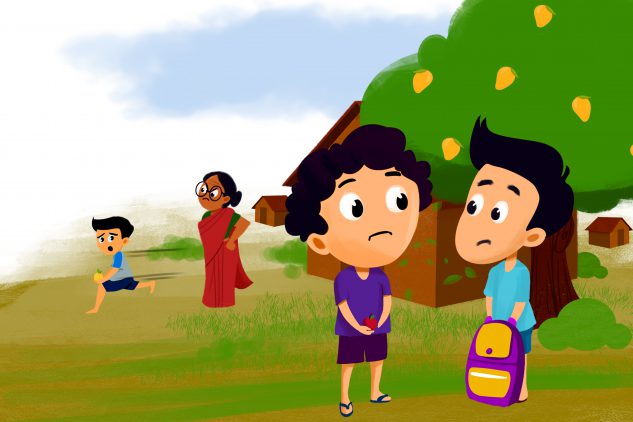
The kids ran away while she was shouting and muttering under her breath at the same time.
Kittu and Venkat stood frozen and looked at each other nervously.
Both were scared now.
Kittu gulped and said softly, “I thought we were the first ones to try and get her mangoes.”
Venkat nudged and whispered, “Let’s drop this idea and leave before she scolds us too.”
Kittu hesitated. He was scared, but the thought of those delicious mangoes wanted him to try. Also, he had an apple.
Surely that would make Mrs. Natrajan kind towards him.
“No, let’s go to her. Don’t forget that I have an apple.”
Venkat hesitated and thought, “What if Kittu is right and he is rewarded with a lot of mangoes? If I don’t help Kittu carry the sack, then Kittu will not even share one mango.” So Venkat agreed to go with Kittu.
Both of them walked up to Mrs. Natrajan and stood before her.
She turned towards them and looked at them.
She had a scowl on her face and when she spoke, they felt she was barking, “What do you want? Mangoes, I bet?”
Both of them got more nervous.
Kittu put on a fake smile and extended the apple towards her.
“For you,” he said.
Mrs. Natrajan looked suspiciously at it and asked, “For me? Why would you bring me an apple for no reason? Is it some sort of a joke?
If yes, then you will be sorry. I mean it. Now run off, you two,” she yelled.
Kittu said smoothly, “No, ma’am, this is a gift for you. It is not a joke. Sweet apple for a sweet lady.”
Venkat looked at him in wonder. He had never heard Kittu speak so sweetly before.
Mrs. Natrajan frowned. Then she looked at the apple and her frown cleared. She almost smiled, and said, “That is very nice of you, boy.”
She took the apple from Kittu and looked it over.
She loved apples so she didn’t waste any time biting into it.
The next moment, she spat it out.
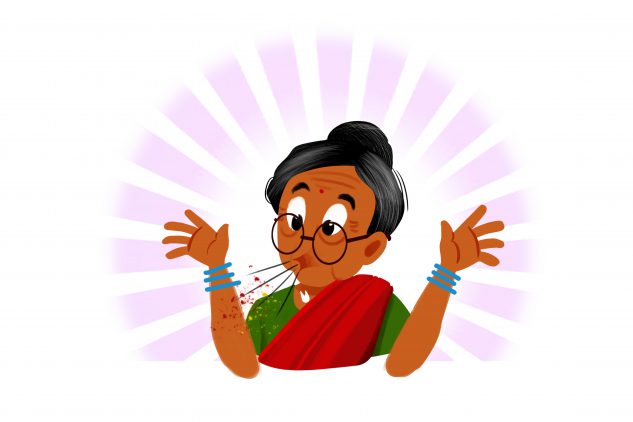
“Blech! Rotten apple! How dare you give this to me?” she yelled.
She threw the apple down and ran towards them.
Kittu and Venkat ran with their empty sack and with Mrs. Natrajan chasing them.
Breathless, Venkat said while on the run, “You and your dumb ideas!”
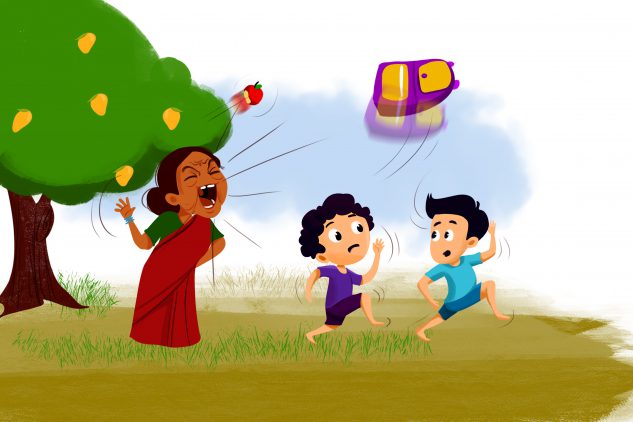
Kittu replied, “How was I to know that the apple was rotten? I found it in our backyard a few days ago. Now, I think my mother must have thrown it out.”
Shocked, Venkat glared at Kittu. “Now you tell me!”And they both ran to save themselves.